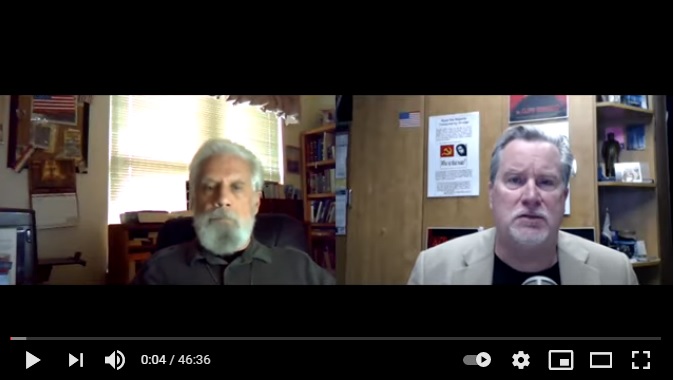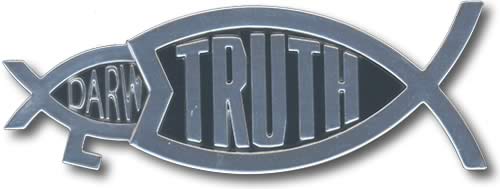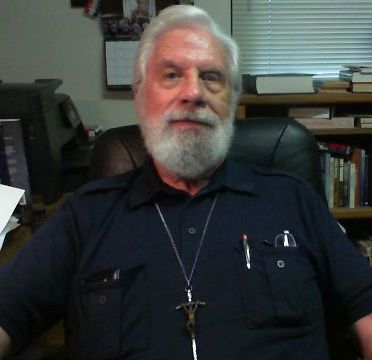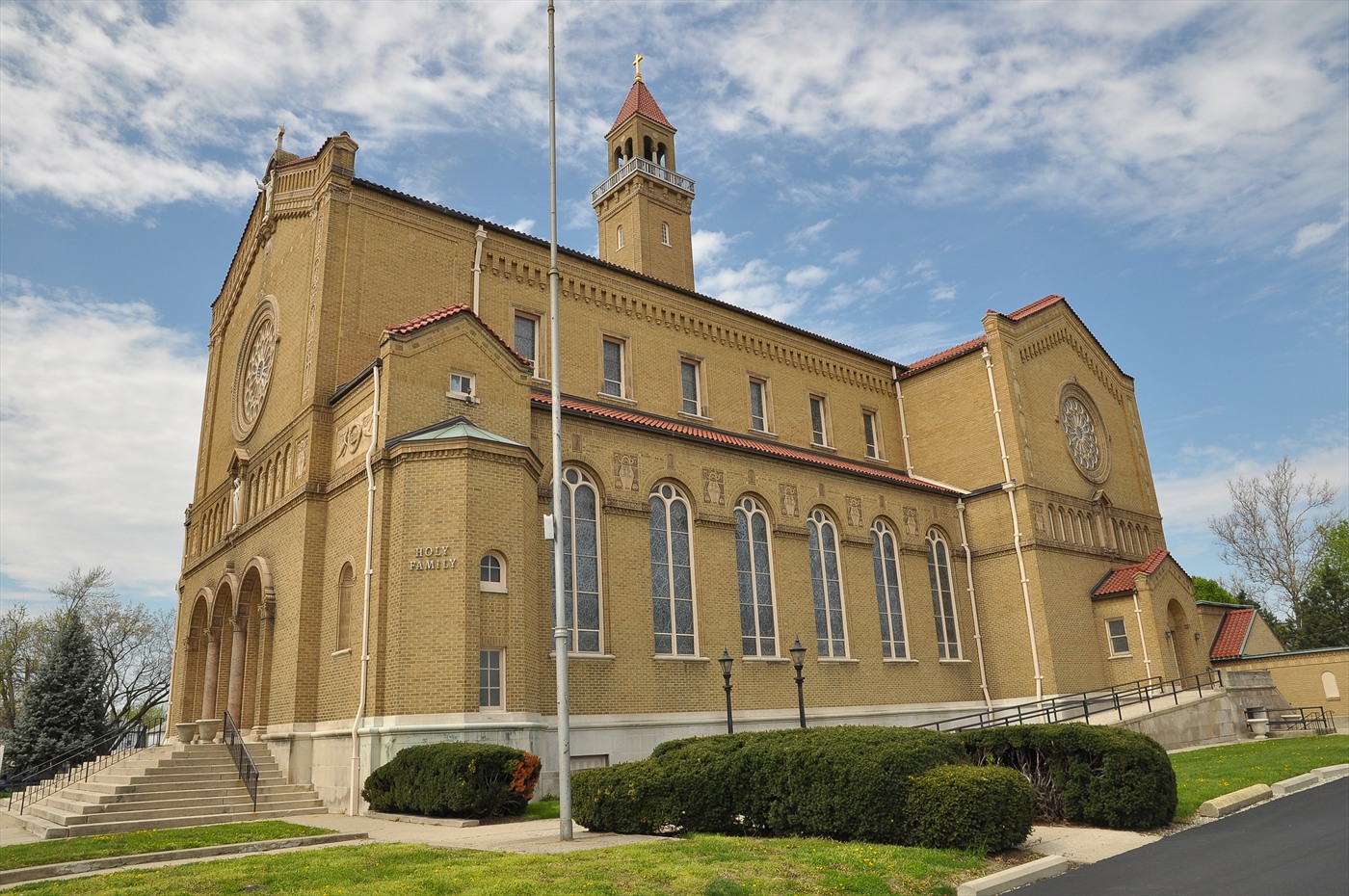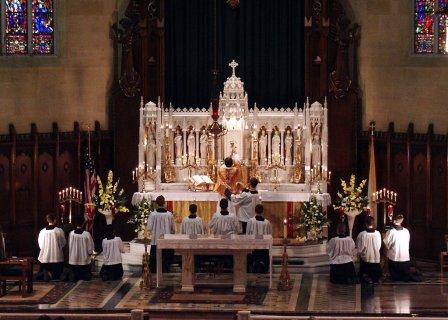Formerly the Thinking Catholic Strategic Center
Confirming Culture=Religion+Politics
Traditional Latin Tridentine Mass
of the
One Holy Catholic Apostolic Church

The Traditional Latin Tridentine Mass Returns.
Vic Biorseth, https://www.catholicamericanthinker.comThanks to the efforts begun by John Paul the Great and continued by Benedict XVI, the 1962 version of the Latin rite of the Roman Catholic Mass is finally beginning to gain back the recognition that it always deserved, and which previously was virtually eliminated, not by the Vatican II Fathers, but by the Vatican II “periti” – the Council “experts.” The more current descriptive term for them is Liturgists.
His Holiness Benedict XVI issued the Motu Proprio Summorum Pontificum July 7, 2007, to take effect September 14, 2007, the Feast of the Exaltation of the Cross. Along with the Motu Proprio, the Vatican released the Holy Father’s Letter to Bishops on Summorum Pontificum, and also an Explanatory Note on Motu Proprio Summorum Pontificum. The Motu Proprio addresses the traditional Latin Tridentine Mass as contained in the 1962 Missal of John XXIII.
By way of explanation of why we should even need to explain and describe the traditional Latin Mass, we need to look at the horrific tale of how it almost disappeared completely from the American Catholic scene, and perhaps even from the world. Go to the Catholic Liturgical Reform page to see a brief history of what happened to our Catholic liturgy, and then return here. The one item of vital importance to note here is this: despite the concerted efforts of multiple liberal bishops and thundering herds of Catholic liturgists, the Traditional Latin Tridentine Mass was never abrogated or repealed by the One Holy Roman Catholic Church. It has always remained valid. It remains the most thoroughly consistent Liturgical form in the Catholic Church today.
But I don’t know Latin is the typical whine of the New Order aficionado. Well, Latin certainly helps, and I wish we all, myself included, were fluent in Latin. I don’t know Latin either. We can all follow along with an English-Latin Missal or with an abbreviated English-Latin Mass pamphlet. Once you become familiarized with the form and flow of the Mass, after you have participated a number of times, you will be able to put the reading material down and pay attention to the priest’s activities.
You know full well Who is up there in that tabernacle. If you’ve attended the Novus Ordo Mass enough times, you know what’s going on in the traditional Latin Tridentine Mass. You know the Confiteor, in English. You know what Gloria in Excelsis means. You know the Creed, and you will come to silently recite it when the Priest and Acolytes are praying the Credo. You know the Lord’s Prayer, and you will come to pray it when the Priest is praying the Pater Noster. You know full well what’s happening when the priest raises the Host, and when he raises the Cup. And you know, or you should know, that the priest is offering prayers for you; that’s a major part of his job, to which his entire life is committed. He needs to know Latin; his acolytes (servers) need to know Latin. The Choir needs to know Latin. It would be preferable if we all knew Latin, but, bottom line, we do not need to know Latin to pray the traditional Latin Tridentine Mass.
I know for a fact that there are lots and lots of people like me out there who don’t really know Latin, but we can sing O Salutarus and Tantum Ergo all the way through, and who can manage to stumble our way through Expositions and Benedictions without visual aids. Here’s the important thing: the priest and the servers and the choir are the chief audible participants; the Mass will go on efficaciously if some of us, or even all of us, do not sing or say the audible responses.
Go, as often as you can. Who knows? In time, you may be recognizing the Credo and the Pater Noster without the use of your Missal.
Despite anything you might have heard from any Liturgists, there are major portions of the Mass, particularly the longer prayers of the priest, that do not need your accompaniment and undivided attention. It is not a mortal sin for you to pray your own prayers, or even to have a (shudder!) Rosary in your hands. However, I predict that once you have attended a certain number of times and become familiar, beginning with following along with English printed material as a guide, that you will begin to pray the entire Mass, in your own way, perhaps with a Missal or other guide, or without it. Everyone is a little different. Learn Latin if you can. If you can’t, don’t let that stop you from attending the Latin Mass.
You will come to realize, in the beauty, the humility, the majesty and the continuous Glory To God nature of this Mass, that, this is the way God should be treated. This web page is intended to help you familiarize with the order and flow of prayers in the traditional Latin Tridentine Mass, so that you won’t be just sitting there wondering what the heck is going on.
I promise you, no one is going to hit you or hurt you if you sit or kneel at the wrong time, or you miss-pronounce something, or if you remain silent.
The Mass Of All The Ages
The development of the Latin rite Mass is traced through a series of links in an unbroken chain beginning with very first mass given by Christ 2,000 years ago at the Last Supper. Beginning with that fateful evening, on every single day that has passed since then, this same offering has been done. It’s been done millions of times for billions of people, just as He commanded.
The Traditional Latin Mass of today is essentially unchanged since the Council of Trent, five centuries ago. Some elements are derived from Jewish customs dating back to pre-Apostolic times, and other parts were developed by Church Fathers and various Saints and Popes. Pope Saint Gregory the Great instituted the Greek Kyrie Eleison and Sacred Chant during his reign. The vestments have changed little since they were developed during ancient Roman empire.
The traditional Latin Tridentine Mass has been quite accurately described as "the most beautiful thing this side of heaven."
Offering/Participating Parts are denoted as follows
P. Priest
D. Deacon
L. Subdeacon/Lector
S. Server/Congregation
C. Choir
V. Versicle
R. Response
`†´ Sign of the Cross
Traditional Latin Tridentine Mass Altar
The traditional Latin Tridentine Mass is offered on an altar, which is Latin for "high place." The right side of the altar, as you face it, is the Epistle side, and the left side is the Gospel side. An altar stone containing relics or images of Saints is imbedded in the front of the altar. On the center-rear of the altar table is the tabernacle, which is Latin for "small inn." The most blessed sacrament of the altar is stored in the tabernacle. A sanctuary lamp burns at all times signifying that our Lord Jesus Christ, body, blood, soul and Divinity, is present in the tabernacle. There is a crucifix on or over the altar, behind and/or above the tabernacle, that is large enough and positioned so as to be clearly visible to everyone in the church. Two beeswax candles (more than two for more solemn high Masses) on left and right light the altar area. The beeswax represents the purity of our Lord’s body, and the candle flame represents His soul. The altar is covered with three linen cloths; the top cloth hangs to the floor. The altar cloths absorb and catch any of the sacred species which may fall or spill. The altar cloths remind us of the wrapping of our Lord's body in the tomb of Resurrection. Relics and images of saints may also adorn the altar background area.
There are other Implements and Vestments used by the priest in the offering of the Tridentine Mass.
Traditional Latin Tridentine Mass
Introduction
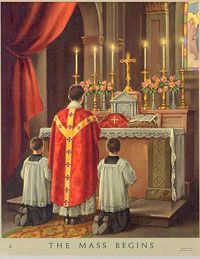
On Sundays before the principal Mass the church and congregation are sprinkled with holy water, in The Asperges.
After the sanctuary lights and altar candles are lit, the bell is rung and the priest approaches the altar. He carries the veiled chalice and the paten containing the unconsecrated host. He places the chalice on the center of the altar, and the Missal to the right (Epistle) side, with colored markers or ribbons pre-set to indicate the changeable sections for that day's Mass.
The priest makes the first sign of the cross, symbolizing that this Mass is to be offered in the name of The Father, and of the Son, and of the Holy Spirit. The sign of the cross will be repeated over 50 times through the course of the Mass.
Psalm 42 is sung during the Mass of the Catechumens (the first part of the Mass) who will mark their spiritual rebirth by being baptized on Easter Sunday.
Traditional Latin Tridentine Mass Asperges
| ORDO MISSAE | ORDINARY OF THE MASS |
| P. Asperges me | P. Thou shalt sprinkle me, |
| C. Domine, hyssopo, et mundabor: lavabis me, et super nivem dealbabor. Ps. 50 Miserere mei, Deus, secundum magnam misericordiam tuam. | C. Lord, with hyssop and I shall be cleansed; thou shalt wash me, and I shall be made whiter than snow. Have mercy on me, O. God, according to thy great mercy. |
| V. Gloria Patri, et Filio, et Spiritui Sancto, | V. Glory be to the Father and to the Son and to the Holy Spirit. |
| R. Sicut erat in principio, et nunc, et semper, et in saecula saeculorum. Amen | R. As it was in the beginning, is now, and ever shall be, world without end. Amen. |
| Antiphon: Asperges me, Domine, hyssopo, et mundabor: lavabis me, et super nivem dealbabor. | Antiphon: Thou shalt sprinkle me, Lord, with hyssop and I shall be cleansed; thou shalt wash me, and I shall be made whiter than snow. |
Traditional Latin Tridentine Mass Asperges During Easter Time
| ORDO MISSAE | ORDINARY OF THE MASS |
| P. Vidi aquam | P. I saw water coming |
| C. egredientem de templo, a latere dextro, alleluia: et omnes ad quos pervenit aqua ista salvi factci sunt, et dicent: Alleluia, alleluia. Ps. 117 Confitemini Domino, quoniam bonus; quoniam in saeculum misericordia ejus. | C. forth from the Temple from the right side, alleluia: and all those were saved to whom that water came, and they shall say alleluia, alleluia. Give praise to the Lord, for he is good,: for His mercy endureth forever. |
| V.Gloria Patri, et Filio, et Spiritui Sancto, | V. Glory be to the Father and to the Son and to the Holy Spirit. |
| R. Sicut erat in principio, et nunc, et semper, et in saecula saeculorum. Amen | R. As it was in the beginning, is now, and ever shall be, world without end. Amen. |
| Antiphon: Vidi aquam egredientem de templo, a latere dextro, alleluia: et omnes ad quos pervenit aqua ista salvi factci sunt, et dicent: Alleluia, alleluia | Antiphon: I saw water coming forth from the Temple from the right side, alleluia: and all those were saved to whom that water came, and they shall say alleluia, alleluia. |
| P. Ostende nobis, Domine, misericordiam tuam. (alleluia) | P. Show us, Lord, Your mercy. (Alleluia) |
| S. Et salutare tuum da nobis (alleluia) | S. And grant us Your salvation. (Alleluia) |
| P. Domine, exaudi orationem meam. | P. O Lord, hear my prayer. |
| S. Et clamor meus ad te veniat. | S. And let my cry come unto You. |
| P. Dominus vobiscum. | P. May the Lord be with you. |
| S. Et cum spiritu tuo. | S. And with your spirit |
| P. Exaudi nos, Domine, sanctae Pater, omnipotens aeterne Deus et mittere digneris sanctum Angelum tuum de caelis, qui custdiat, foveat, protegat, vistet, atque defendat omnes habitantes in hoc habitaculo. Per Christum Dominum nostrum. | P. Let us pray. Hear us Lord, holy Father, almighty and eternal God; and graciously send Your Holy Angel from heaven to watch over, to cherish, to protect, to abide with, and to defend all who dwell in this house. Through Christ our Lord. |
| S. Amen | S. Amen. |
Traditional Latin Tridentine Mass Begins
with Mass of the Catechumens
| ORDO MISSAE | ORDINARY OF THE MASS |
| P. In nomine Patris, et Filii, et Spiritus Sancti. | P. In the Name of the Father, and of the Son, + and of the Holy Spirit. |
| S. Amen. | S. Amen |
| P. Introibo ad altare Dei | P. I will go to the altar of God. |
| S Ad Deum qui laetificat juventutem meam. | S. To God, the joy of my youth. |
(Psalm 42 – Omit during Passiontide and Requiem Mass)
| ORDO MISSAE | ORDINARY OF THE MASS |
| P. Judica me, Deus, et discerne causam meam de gente non sancta: ab homine iniquo et doloso erue me. | P. Do me justice, O God, and fight my fight against an unholy people, rescue me from the wicked and deceitful man. |
| S. Quia tu es, Deus, fortitudo mea: quare me repulisti, et quare tristis incedo, dum affligit me inimicus? | S. For Thou, O God, art my strength, why hast Thou forsaken me? And why do I go about in sadness, while the enemy harasses me? |
| P. Emitte lucem tuam et veritatem tuam: ipsa me deduxerunt et adduxerunt in montem sanctum tuum, et in tabernacula tua. | P. Send forth Thy light and thy truth: for they have led me and brought me to thy holy hill and Thy dwelling place. |
| S. Et introibo ad altare Dei: ad Deum qui laetificat juventutem meam. | S. And I will go to the altar of god, to God, the joy of my youth. |
| P. Confitebor tibi in cithara, Deus, Deus meus quare tristis es anima mea, et quare conturbas me? | P. I shall yet praise Thee upon the harp, O God, my God. Why art thou sad, my soul, and why art thou downcast? |
| S. Spera in Deo, quoniam adhuc confitebor illi: salutare vultus mei, et Deus meus. | S. Trust in God, for I shall yet praise Him, my Savior, and my God. |
| P. Gloria Patri, et Filio, et Spiritui Sancto. | P. Glory be to the Father, and to the Son, and to the Holy Spirit. |
| S. Sicut erat in principio, et nunc, et semper: et in saecula saeculorum. Amen. | S. As it was in the beginning is now, and ever shall be, world without end. Amen. |
| P. Introibo ad altare Dei. | P. I will go to the altar of God. |
| S. Ad Deum qui laetificat juventutem meam. | S. To God, the joy of my youth. |
| P. Adjutorium nostrum in nomine Domini. | P. Our help + is in the Name of the Lord. |
| S. Qui fecit coelum et terram. | S. Who made heaven and earth. |
Traditional Latin Tridentine Mass Confiteor
As culpable sinners, none of us (including our priest) are worthy of the mercy of our Lord and Judge Jesus Christ. In humble adoration, we give thanks and express deep sorrow for all of our shortcomings, and we humbly ask Him to watch over and keep us, as our Father.
As Christians we know that for God there is little differentiation between this world and the next, and that the saints in Heaven and the souls in Purgatory exist within His creation just the same as we exist in His creation here on earth. We are therefore just as much in communion with them as we are with those remaining here with us on earth.
We humbly ask for their prayers for us, even as we pray for them and for each other.
The priest bows profoundly low and begins.
(Priest’s Confession)
| ORDO MISSAE | ORDINARY OF THE MASS |
| P. Confiteor Deo omnipotenti, beatae Mariae semper Virgini, beato Michaeli Archangelo, beato Joanni Baptistae, sanctis Apostolis Petro et Paulo, omnibus Sanctis, et vobis fratres: quia peccavi nimis cogitatione verbo, et opere: mea culpa, mea culpa, mea maxima culpa. Ideo precor beatam Mariam semper Virginem, beatum Michaelem Archangelum, beatum Joannem Baptistam, sanctos Apostolos Petrum et Paulum, omnes Sanctos, et vos fratres, orare pro me ad Dominum Deum Nostrum. | P. I confess to Almighty God, to Blessed Mary ever Virgin, to Blessed Michael the Archangel, to Blessed John the Baptist, to the Holy Apostles Peter and Paul, to all the angels and saints, and to you my brothers and sisters, that I have sinned exceedingly in thought, word, deed. (He strikes his breast three times saying) through my fault, through my fault, through my most grievous fault, and I ask Blessed Mary ever Virgin, Blessed Michael the Archangel, Blessed John the Baptist, the Holy Apostles Peter and Paul, all the Angels and Saints, and you my brothers and sisters, to pray for me to the Lord our God. |
| S. Misereatur tui omnipotens Deus, et dimissis peccatis tuis, perducat te ad vitam aeternam. | S. May almighty God have mercy on you, forgive you all your sins, and bring you to everlasting life. |
| P. Amen. | P. Amen. |
(People’s Confession – the servers bow profoundly low)
| ORDO MISSAE | ORDINARY OF THE MASS |
| S. Confiteor Deo omnipotenti, beatae Mariae semper Virgini, beato Michaeli Archangelo, beato Joanni Baptistae, sanctis Apostolis Petro et Paulo, omnibus Sanctis, et tibi Pater: quia peccavi nimis cogitatione verbo, et opere: mea culpa, mea culpa, mea maxima culpa. Ideo precor beatam Mariam semper Virginem, beatum Michaelem Archangelum, beatum Joannem Baptistam, sanctos Apostolos Petrum et Paulum, omnes Sanctos, et te Pater, orare pro me ad Dominum Deum Nostrum. | S. I confess to Almighty God, to Blessed Mary ever Virgin, to Blessed Michael the Archangel, to Blessed John the Baptist, to the Holy Apostles Peter and Paul, to all the angels and saints, and to you my brothers and sisters, that I have sinned exceedingly in thought, word, deed. (Strike your breast three times saying) through my fault, through my fault, through my most grievous fault, and I ask Blessed Mary ever Virgin, Blessed Michael the Archangel, Blessed John the Baptist, the Holy Apostles Peter and Paul, all the Angels and Saints, and you Father, to pray for me to the Lord our God. |
| P. Misereatur vestri omnipotens Deus, et dimissis peccatis vestris, perducat vos ad vitam aeternam. | P. May Almighty God have mercy on you, forgive you your sins, and bring you to everlasting life. |
| S. Amen. | S. Amen. |
| P. Indulgentiam absolutionem, et remissionem peccatorum nostrorum, tribuat nobis omnipotens et misericors Dominus. | P. May the Almighty and Merciful Lord grant us pardon, + absolution, and remission of our sins. |
| S. Amen. | S. Amen. |
| P. Deus, tu conversus vivificabis nos. | P. Turn to us, O God, and bring us life. |
| S. Et plebs tua laetabitur in te. P. Ostende nobis Domine, misericordiam tuam. | S. And Your people will rejoice in You. |
| P. Ostende nobis Domine, misericordiam tuam. | P. Show us, Lord, Your mercy. |
| S. Et salutare tuum da nobis. | S. And grant us Your salvation. |
| P. Domine, exaudi orationem meam. | P. O Lord, hear my prayer. |
| S. Et clamor meus ad te veniat. | S. And let my cry come to You. |
| P. Dominus vobiscum. | P. May the Lord be with you. |
| S. Et cum spiritu tuo. | S. And with your spirit. |
| P. Oremus. | P. Let us pray. |
(The priest prays the following words inaudibly while ascending to the altar.)
| ORDO MISSAE | ORDINARY OF THE MASS |
| P. Aufer a nobis, quaesumus, Domine, iniquitates nostras ut ad Sancta sanctorum puris mereamur mentibus introire. Per Christum Dominum nostrum. Amen. | P. Take away from us, O Lord, we beseech You, that we may enter with pure minds into the Holy of Holies. Through Christ our Lord. Amen. |
(The priest kisses the altar where the relics are, praying the following.)
| ORDO MISSAE | ORDINARY OF THE MASS |
| P. Oramus te. Domine, per merita Sanctorum tuorum, quorum reliquiae hic sunt, et omnium Sanctorum: ut indulgere digneris omnia peccata mea. Amen. | P. We beseech You, O Lord, by the merits of Your Saints whose relics lie here, and of all the Saints, deign in your mercy to pardon me all my sins. Amen. |
(If this is a high Mass (which is sung) the priest incenses the altar praying the following.)
P: May this incense be blessed by Him in Whose honor it is to be burned. Amen.
Traditional Latin Tridentine Mass
Introit
The word "Introit" means to introduce, or to enter. The Introit is a Psalm that introduces the mass for the particular day; it varies with the liturgical calendar. The Introit has its roots in the Psalms that were sung by choirs as the procession of priests and clergy would enter the church, beginning the mass of the as yet un-baptized catechumens.
From the Epistle (right) side of the altar, the priest reads the specific Introit for the specific Mass being celebrated that day. After he is done he concludes with "Glory be to the Father and to the son and to the Holy Spirit Amen", and then he proceeds to the middle of the altar.
(Amen is taken from the Hebrew term meaning "may it be as prayed".)
Traditional Latin Tridentine Mass
Kyrie
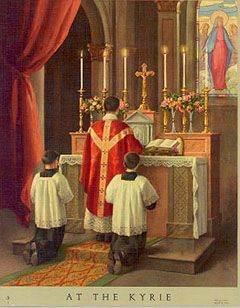
Kyrie eleison (pronounced kee-ree-ay ay-layee-son) is Greek for "Lord have Mercy", and "Christe eleison" is Greek for "Christ have mercy". It is a prayer for redemption which dates to very early Byzantine Greek masses. In the Western (Latin) Church it dates back 16 centuries to the era of Pope Saint Gregory the Great, who was a major influence and instrument of God in the conversion of Europe, and in the development of “chant” and much of our sacred music.
From the middle of the altar the priest says, alternating with the server(s):
| ORDO MISSAE | ORDINARY OF THE MASS |
| P. Kyrie eleison. | P. Lord, have mercy. |
| S. Kyrie eleison. | S. Lord, have mercy. |
| P. Kyrie eleison. | P. Lord, have mercy. |
| S. Christe eleison. | S. Christ, have mercy. |
| P. Christe eleison. | P. Christ, have mercy. |
| S. Christe eleison. | S. Christ, have mercy. |
| P. Kyrie eleison. | P. Lord, have mercy. |
| S. Kyrie eleison. | S. Lord, have mercy. |
| P. Kyrie eleison. | P. Lord, have mercy. |
Traditional Latin Tridentine Mass
Gloria
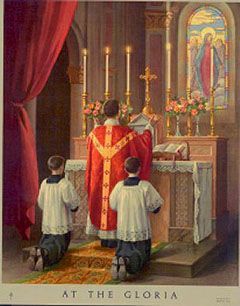
After our plea for mercy "Glory in the Highest" reflects our joy and praise, originating from the song of the angels on the night Jesus was born.
The priest then turns and says in Latin, "The Lord be with you", to which the response is "and with your spirit." This was the ancient way that Christians greeted each other. The Gloria is omitted for penitential seasons, Masses for the dead and certain other Masses.
Standing at the middle of the altar, the priest extends and joins his hands, Makes a slight bow says:
| ORDO MISSAE | ORDINARY OF THE MASS |
| P. Gloria in exceslis Deo. | P. Glory to God in the highest. |
The priest concludes the Gloria below and sits while the choir sings it.
| ORDO MISSAE | ORDINARY OF THE MASS |
| C. Et in terra pax hominibus bonae voluntatis. Laudamus te. Benedicimus te. Adoramus te. Glorificamus te. Gratias agimus tibi propter magnam gloriam tuam. Domine Deus, Rex coelestis, Deus Pater omnipotens. Domine Fili unigenite, Jesu Christe. Domine Deus, Agnus Dei, Filius Patris, Qui tollis peccata mundi, miserere nobis. Qui tollis peccata mundi, suscipe deprecationem nostram. Qui sedes ad dexteram Patris, miserere nobis. Quoniam tu solus Sanctus. Tu solus Dominus. To solus Altissimus, Jesu Christe. Cum Sancto Spiritu in gloria Dei Patris.. Amen. | C. And on earth peace to people of good will. We praise You. We bless You. We worship You. We glorify You. Lord God, heavenly King, God the Father almighty. Lord Jesus Christ, the Only-begotten Son. Lord God, Lamb of God, Son of the Father. You who take away the sins of the world, have mercy on us.. You who take away the sins of the world, receive our prayer. You who sit at the right hand of the Father, have mercy on us. For You alone are holy. You alone are Lord. You alone are the Most High, Jesus Christ, with the Holy Spirit, in the Glory of God the Father. Amen. |
Turning toward the people, the priest says:
| ORDO MISSAE | ORDINARY OF THE MASS |
| P. Dominus Vobiscum. | P. May the Lord be with you. |
| S. Et cum spiritu tuo. | S. And with your Spirit. |
| P. Oremus. | P. Let us pray. |
Traditional Latin Tridentine Mass
Collect
Origination: In the very early days of the Church, Christian worshipers and clergy would form processions that would proceed to various churches where the local people would gather known as the ecclesia collect (church assembly) to conduct mass. At these masses, a community prayer with specific intentions was offered. The Collect is usually a short prayer or series of prayers that vary depending on the day or instruction from the Holy See or a bishop.
Here the priest says the specific Prayers appointed for the day.
Traditional Latin Tridentine Mass
Epistle, Gradual, Tract, Sequence, Gospel, Homily and Credo
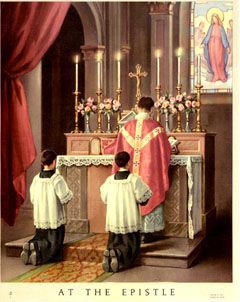
The Epistle or "letter" is usually taken from one of Saint Paul's or another of the letters written by the original twelve apostles to the faithful following the death and resurrection of our Lord. The Epistle and Gospel are first read in Latin at the altar, then more loudly in the vernacular from the pulpit just before the sermon or Homily.
After the Epistle and before the Gospel priest recites the Gradual, Tract, and/or the Sequence for the day if required in the propers for the day's feast. The Gradual is a short prayer or Psalm that relates to the preceding Epistle. The tract is also usually from Psalms and replaces the Alleluja during Lent. The Sequence or "following out" is the last of these short prayers.
We stand and remain standing during the word of our Lord or "Gospel" (from the Anglo Saxon word "godspell"). In early times, an entire book from Matthew, Mark, Luke or John was read or sung entirely. Instead of being read in order, the Gospel readings are now suited to the feast or Mass of that day.
The Nicene Creed was first developed during the Council of Nicea in the year 325 AD. As Catholics, the Credo is our faithful declaration of commitment to the word of God and our church. In early Masses the doors were shut and locked while the Catechumens took this solemn oath before baptism and then again after first communion.
Traditional Latin Tridentine Mass
Epistle
At the Epistle (right) side of the altar, the priest reads the Epistle from the Mass he is celebrating, after which the server says:
| ORDO MISSAE | ORDINARY OF THE MASS |
| S. Deo gratias. | S. Thanks be to God. |
Here the Gradual is sung by the schola, while the preparation for the Gospel occurs (the server moves the Missal from the Epistle (right) side of the altar to the Gospel (left) side of the altar). The Alleluia, and Sequence Paschale victimae in the Easter Vigil, Veni, sancte Spiritus on Pentecost, Lauda Sion on Corpus Christi, Stabat Mater on Our Lady of Sorrows, Dies Irae on All Souls and in requiem and Funeral Masses. In Lent and at Masses for the dead the Alleluia is omitted and a tract sung instead.
Before reading the Gospel, the priest (or the deacon) returns to the center, bows down, joins his hands, and says:
| ORDO MISSAE | ORDINARY OF THE MASS |
| D. Munda cor meum ac labia mea, omnipotens Deus, qui labia Isaiae Prophetae calculo mundasti ignito: ita me tua grata miseratione dignare mundare, ut sanctum Evangelium tuum digne valeam nuntiare. Per Christum Dominum nostrum. Amen. Jube, Domine benedicere. | D. Cleanse my heart and my lips, O Almighty God, Who cleansed the lips of the Prophet Isaiah with a burning coal. In Your gracious mercy deign so to purify me that I may worthily proclaim Your holy Gospel. Through Christ our Lord. Amen. Lord, grant me your blessing. |
| P. Dominus sit in corde meo et in labiis meis. ut digne et competenter annuntiem evangelium suum. | P. The Lord be in your heart and on your lips that you may worthily and fittingly proclaim His holy Gospel. In the name of the Father, and of the Son, + and of the Holy Spirit. |
| D. Amen. | D. Amen. |
Traditional Latin Tridentine Mass
Gospel
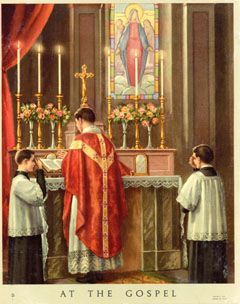
Traditional Latin Tridentine Mass
Credo
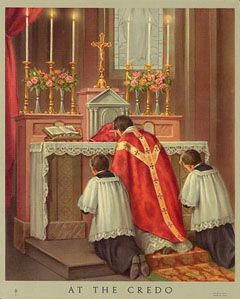
After the Homily, the priest goes to the middle of the altar and begins the Creed. As with the Gloria, he begins the Creed, then is seated while the choir sings it.
| ORDO MISSAE | ORDINARY OF THE MASS |
| C. Credo in unum Deum, Patrem omnipotentem, factorem coeli et terrae, visibilium omnium et invisibilium. Et in unum Dominum Jesum Christum, Filium Dei unigenitum. Et ex Patre natum ante omnia saecula. Deum de Deo, lumen de lumine, Deum verum de Deo vero. Genitum, not factum, consubstantialem Patri: per quem omnia facta sunt. Qui propter nos homines, et propter nostram salutem descendit de coelis. Et incarnatus est de Spiritu Sancto ex Maria Virgine: ET HOMO FACTUS EST. Crucifixus etiam pro nobis; sub Pontio Pilato passus, et sepultus est. Et resurrexit tertia die, secundum Scripturas. Et ascendit in coelum: sedet ad dexteram Patris. Et iterum venturus est cum gloria judicare vivos et mortuos. cujus regni non erit finis. Et in Spiritum Sanctum, Dominum et vivificantem: qui ex Patre Filioque procedit. Qui cum Patre, et Filio simul adoratur et conglorificatur: qui locutus est per Prophetas. Et unam, sanctam, catholicam et apostolicam Ecclesiam. Confiteor unum baptisma in remissionem peccatorum. Et exspecto resurrectionem mortuorum. Et vitam venturi saeculi. Amen. | C. I believe in one God, The Father Almighty, Maker of heaven and earth, and of all things visible and invisible. And in one Lord, Jesus Christ, the Only-begotten Son of God. Born of the Father before all ages. God of God, Light of Light, true God of true God. Begotten, not made, of one substance with the Father. By whom all things were made. Who for us men and for our salvation came down from heaven. (here all present kneel) And became incarnate by the Holy Spirit of the Virgin Mary: AND WAS MADE MAN. (here all arise) He was also crucified for us, suffered under Pontius Pilate, and was buried. And on the third day He rose again according to the Scriptures. He ascended into heaven and sits at the right hand of the Father. He will come again in glory to judge the living and the dead and His kingdom will have no end. And in the Holy Spirit, the Lord and Giver of life, Who proceeds from the Father and the Son. Who together with the Father and the Son is adored and glorified, and who spoke through the prophets. And one holy, Catholic and Apostolic Church. I confess one baptism for the forgiveness of sins and I await the resurrection of the dead and the life + of the world to come. Amen. |
| P. Dominus vobiscum. | P. May the Lord be with you. |
| S. Et cum spiritu tuo. | S. And with your spirit. |
| P. Oremus. | P. Let us pray. |
At this point the Mass of the Catechumens ends, and the Mass of thd Faithful continues. In the ancient Church the Catechumens (those who had not yet received First Communion) were dismissed here.
Traditional Latin Tridentine Mass
Offertory
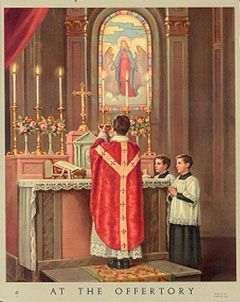
The priest reads the prayer, which makes an offering of the unconsecrated bread and wine (offertory) to God for the Mass. He then asks the Lord to please accept (suscipe) our offering, despite our unworthiness, for all Christians, living and dead.
In the ancient Church, worshipers would proceed to the altar bringing gifts of food, gold and other property.
The unleavened wheaten bread is specially prepared and the wine, red or white, is fermented purely and naturally. It is mixed, with prayer, with a small amount of water as Christ did at the last supper. His blood also came forth mixed with water when He died on the cross. To keep out dust, the chalice is cleaned before and covered after pouring the water and wine into it while reciting a prayer.
Offertory Verse: The Offertory Antiphon is sung while the priest begins the prayers.
Offertory Prayers: Prayers are said in a low voice while the Choir sings the Verse.
All sit.| ORDO MISSAE | ORDINARY OF THE MASS |
| P. Suscipe, sancte Pater, omnipotens aeterne Deus, hanc immaculatam hostiam, quam ego indignus famulus tuus offero tibi, Deo meo vivo et vero, pro innumerabilibus peccatis, et offensionibus, et negligentiis meis, et pro omnibus circumstantibus, sed et pro omnibus fidelibus Christianis vivis atque defunctis. ut mihi, et illis proficiat ad salutem in vitam aeternam. | P. Accept, O Holy Father, Almighty and eternal God, this spotless host, which I, your unworthy servant, offer to You, my living and true God, to atone for my numberless sins, offenses and negligences; on behalf of all here present and likewise for all faithful Christians living and dead, that it may profit me and them as a means of salvation to life everlasting. |
| S.Amen. | S.Amen. |
| P. Deus, qui humanae substantiae dignitatem mirabiliter condidisti, et mirabilius reformasti: da nobis per hujus aquae et vini mysterium, ejus divinitatis esse consortes, qui humanitatis nostrae fieri dignatus est particeps, Jesus Christus Filius tuus Dominus noster: Qui tecum vivit et regnat in unitate Spiritus Sancti Deus. per omnia saecula saeculorum. Amen. | P. O God, + who established the nature of man in wondrous dignity, and still more admirably restored it, grant that by the mystery of this water and wine, may we come to share in His Divinity, who humbled himself to share in our humanity, Jesus Christ, Your Son, our Lord. who lives and reigns with You in the unity of the holy Spirit, one God, forever and ever. Amen. |
| P. Offerimus tibi, Domine, calicem salutaris tuam deprecantes clementiam: ut in conspectu divinae majestatis tuae, pro nostra et totius mundi salute cum odore suavitatis ascendat. Amen. | P. We offer You, O Lord, the chalice of salvation, humbly begging of Your mercy that it may arise before Your divine Majesty, with a pleasing fragrance, for our salvation and for that of the whole world. Amen. |
| P. In spiritu humilitatis, et in animo contrito suscipiamur a te, Domine, et sic fiat sacrificium nostrum in conspectu tuo hodie, ut placeat tibi, Domine Deus. | P. In a humble spirit and with a contrite heart, may we be accepted by You, O Lord, and may our sacrifice so be offered in Your sight this day as to please You, O Lord God. |
| P. Veni, Sanctificator omnipotens aeterne Deus. et benedic hoc sacrificum tuo sancto nomini praeparatum. | P. Come, O Sanctifier, Almighty and Eternal God, and bless, + this sacrifice prepared for the glory of Your holy Name. |
When Mass is sung, the priest blesses Incense, saying:
| ORDO MISSAE | ORDINARY OF THE MASS |
| P. Per intercessionem beati Michaelis Archangeli, stantis a dextris altaris incensi, et omnium electorum suorum, incensum istud dignetur Dominus benedicere, et in odorem suavitatis accipere. Per Christum Dominum nostrum. Amen. | P. Through the intercession of Blessed Michael the Archangel, standing at the right hand of the altar of incense, and of all His elect may the Lord vouchsafe to bless + this incense and to receive it in the odor of sweetness. Through Christ our Lord. Amen. |
The priest censes the offerings, the cross and the altar, saying:
| ORDO MISSAE | ORDINARY OF THE MASS |
| P. Incensum istud a te benedictum, ascendat ad te, Domine, et descendat super nos misericordia tua. | P. May this incense blessed by You, arise before You, O Lord, and may Your mercy come down upon us. |
The priest incenses the altar.
| ORDO MISSAE | ORDINARY OF THE MASS |
| P. Dirigatur, Domine, oratio mea sicut incensum in conspectu tuo: elevatio manuum mearum sacrificium vespertinum. Pone, Domine, custodiam ori meo, et ostium circumstantiae labiis meis : ut non declinet cor meum in verba malitiae, ad excusandas excusationes in peccatis. | P. Let my prayer, O Lord, come like incense before You; the lifting up of my hands, like the evening sacrifice. O Lord, set a watch before my mouth, a guard at the door of my lips. Let not my heart incline to the evil of engaging in deeds of wickedness. |
He hands back the thruible.
| ORDO MISSAE | ORDINARY OF THE MASS |
| P. Accendat in nobis Dominus ignem sui amoris, et flammam aeterne caritatis. Amen. | P. May the Lord enkindle in us the fire of His love and the flame of everlasting charity. Amen. |
At this point, the celebrant, the ministers, the servers, and the people are censed, in that order.
Traditional Latin Tridentine Mass
Lavabo
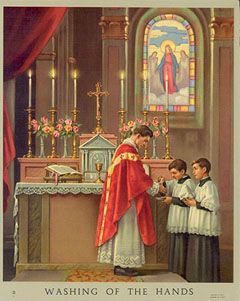
Lava: Latin for for wash (or bathe.) In the ancient church the priest would clean his hands after receiving gifts of oil, food and other goods. In the past it has been symbolic of Pilate washing his hands of Jesus' blood.
The priest then begins to recite Psalm 26 with "I shall wash" while the server pours water from a cruet over his fingers. He then prays the Gloria Patria and moves to the center of the altar and recites the seventh offertory prayer, in which he asks the Holy Trinity to accept our sacrifice in commemoration of our Lord's passion and resurrection and in remembrance of our Blessed Virgin Mother and the saints.
Going to the Epistle (right) side of the altar, the priest washes his fingers and says:
| ORDO MISSAE | ORDINARY OF THE MASS |
| P. Lavabo inter innocentes manus meas. et circumdabo altare tuum, Domine. Ut audiam vocem laudis. et enarrem universa mirabila tua. Domine, dilexi decorem domus tuae: et locum habitationis gloriae tuae. Ne perdas cum impiis, Deus animam meam: et cum viris sanguinum vitam meam: in quorum manibus iniquitates sunt: dextera eorum repleta est muneribus. Ego autem in innocentia mea ingressus sum: redime me, et miserere mei. Pes meus stetit in directo: in ecclesiis benedicam te, Domine. | P. I wash my hands in innocence, and I go around Your altar, O Lord, giving voice to my thanks, and recounting all Your wondrous deeds. O Lord, I love the house in which You dwell, the tenting place of Your glory. Gather not my soul with those of sinners, nor with men of blood my life. On their hands are crimes, and their right hands are full of bribes. But I walk in integrity; redeem me, and have pity on me My foot stands on level ground; in the assemblies I will bless You, O Lord. |
| Gloria Patri, et Filio, et Spiritui Sancto. Sicut erat in principio, et nunc, et semper: et in saecula saeculorum. Amen. | Glory be to the Father, and to the Son, and to the Holy Spirit. As it was in the beginning, is now, and ever shall be, world without end. Amen. |
Facing the middle of the altar the priest continues.
| ORDO MISSAE | ORDINARY OF THE MASS |
| P. Suscipe sancta Trinitas, hanc oblationem, quam tibi offerimus ob memoriam passionis, resurrectionis, et ascensionis Jesu Christi Domini nostri: et in honorem beatae Mariae semper Virginis, et beati Joannis Baptistae, et sanctorum Apostolorum Petri et Pauli, et istorum, et omnium Sanctorum: ut illis proficiat ad honorem, nobis autem ad salutem: et illi pro nobis intercedere dignentur in coelis, quorum memoriam agimus in terris. Per eumdem Christum Dominum nostrum. S. Amen. | P. Accept, most Holy Trinity, this offering which we are making to You in remembrance of the passion, resurrection, and ascension of Jesus Christ, Our Lord; and in honor of blessed Mary, ever Virgin, Blessed John the Baptist, the Holy Apostles Peter and Paul, and of (name of the Saints whose relics are in the Altar) and of all the Saints; that it may add to their honor and aid our salvation; and may they deign to intercede in heaven for us who honor their memory here on earth. Through the same Christ our Lord. |
| S. Amen. | S. Amen. |
The priest kisses the altar, turns to the people and says:
| ORDO MISSAE | ORDINARY OF THE MASS |
| P. Orate fratres, ut meum ac vestrum sacrificium acceptabile fiat apud Deum Patrem omnipotentem. | P. Pray brethren, that my Sacrifice and yours may be acceptable to God the Father Almighty. |
| S. Suscipiat Dominus sacrificium de manibus tuis ad laudem et gloriam nominis sui, ad utilitatem quoque nostram, totiusque Ecclesiae suae sanctae. | S. May the Lord receive the Sacrifice from your hands to the praise and glory of His Name, for our good, and that of all His holy Church. |
Traditional Latin Tridentine Mass
Secret Prayer

With his hands extended, the priest says the Secret prayers.
Preface:
"Per ominia saecula saeculorum" (forever and ever) begins the preface where we give thanks and praise to God. It concludes with The Sanctus, a prayer of union with the heavenly hosts and of adoration of the most "Holy, Holy, Holy" triune God.
Most often the Preface will be The Preface of the Most Holy Trinity (below) unless another is substituted, such as the Preface of the Nativity or the Preface of the Epiphany.
Then the priest now says, in a louder voice:
| ORDO MISSAE | ORDINARY OF THE MASS |
| P: Per omnia saecula saeculorum. | P: World without end. |
| S: Amen. | S: Amen. |
| P: Dominus vobiscum. | P: The Lord be with you. |
| S: Et cum spiritu tuo. | S: And with thy spirit. |
| P: Sursum corda. | P: Lift up your hearts. |
| S: Habemus ad Dominum. | S: We have them lifted up unto the Lord. |
| P: Gratias agamus Domino Deo nostro. | P: Let us give thanks to the Lord our God. |
| S: Dignum et justum est. | S: It is meet and just. |
| P: Vere dignum et justum est, aequum et salutare, nos tibi semper, et ubique gratias agere: Domine sancte, Pater omnipotens, aeterne Deus. Qui cum unigenito Filio tuo, et Spiritu Sancto, unus es Deus, unus es Dominus: non in unius singularitate personae, sed in unius Trinitate substantiae. Quod enim de tua gloria, revelante te, credimus, hoc de Filio tuo, hoc de Spritu sancto, sine differentia discretionis sentimus. Ut in confessione verae, sempiternaeque Deitatis, et in personis proprietas, et in essentia unitas, et in majestate adoretur aequalitas. Quam laudant Angeli, atque Archangeli, Cherubim quoque ac Seraphim: qui non cessant clamare quotidie, una voce dicentes: | P: It is truly meet and just, right and profitable, for us, at all times, and in all places, to give thanks to Thee, O Lord, the holy One, the Father almighty, the everlasting God: Who, together with Thine only-begotten Son and the Holy Ghost, art one God, one Lord, not in the singleness of one Person, but in the Trinity of one substance. For that which, according to Thy revelation, we believe of Thy glory, the same we believe of Thy Son, the same of the Holy Ghost, without difference or distinction; so that in the confession of one true and eternal Godhead we adore distinctness in persons, oneness in essence, and equality in majesty: Which the angels praise, and the archangels, the cherubim also and the seraphim, who cease not, day by day crying out with one voice to repeat: |
Here the bell is rung three times.
| ORDO MISSAE | ORDINARY OF THE MASS |
| P: Sanctus, Sanctus, Sanctus, Dominus Deus Sabaoth. Pleni sunt coeli et terra gloria tua. Hosanna in excelsis. Benedictus qui venit in nomine Domini. Hosanna in excelsis. | P: Holy, holy, holy, Lord God of hosts. The heavens and the earth are full of Thy glory. Hosanna in the highest. Blessed is He Who cometh in the name of the Lord. Hosanna in the highest. |
Traditional Latin Tridentine Mass
Canon Of The Mass
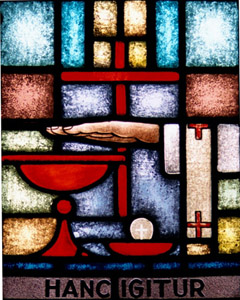
Canon translates to "measuring stick" in Greek. It starts with the three remembrances: first, for the church in which we ask God to accept and bless our gifts through His Son Jesus Christ; second, for the living, in which we pray for for protection and peace in His Church; third, offering up to to God those offering the Mass, including all those present, the angels and saints, and our Blessed Mother.
The priest then begins the offering prayer (Hanc Igitur) of the Mass while holding his hands over the chalice with his thumbs overlapped in a cross, representing the sins of the world that Christ took upon Himself. In times before the new and everlasting covenant, a similar gesture was made over the Lambs and other victims of sacrifice at the altar of God.
The priest prays silently:
| ORDO MISSAE | ORDINARY OF THE MASS |
| P: Te igitur clementissime Pater, per Jesum Christum Filium tuum Dominum nostrum, supplices rogamus ac petimus, uti accepta habeas, et benedicas haec `†´ dona, haec `†´ munera, haec `†´ sancta sacrificia illibata, in primis quae tibi offerimus pro Ecclesia tua sancta Catholica; quam pacificare, custodire, adunare, et regere digneris toto orbe terrarum: una cum famulo tuo Papa nostro "N." et Antistite nostro "N." et omnibus orthodoxis, atque Catholicae et Apostolicae fidei cultoribus. | P: Therefore, we humbly pray and beseech Thee, most merciful Father, through Jesus Christ Thy Son, Our Lord, to receive and to bless these `†´ gifts, these `†´ presents, these `†´ holy unspotted sacrifices, which we offer up to Thee, in the first place, for Thy holy Catholic Church, that it may please Thee to grant her peace, to guard, unite, and guide her, throughout the world: as also for Thy servant N., our Pope, and N., our Bishop, and for all who are orthodox in belief and who profess the Catholic and apostolic faith. |
Commemoration of the Living
| ORDO MISSAE | ORDINARY OF THE MASS |
| P: Memento Domine famulorum, famularumque tuarum "N." et "N." et omnium circumstantium, quorum tibi fides cognita est, et nota devotio, pro quibus tibi offerimus: vel qui tibi offerunt hoc sacrificium laudis pro se, suisque omnibus: pro redemptione animarum suarum, pro spe salutis et incolumitatis suae: tibique reddunt vota sua aeterno Deo vivo et vero. | P: Be mindful, O Lord, of Thy servants, N. and N., and of all here present, whose faith and devotion are known to Thee, for whom we offer, or who offer up to Thee, this sacrifice of praise, for themselves, their families, and their friends, for the salvation of their souls and the health and welfare they hope for, and who now pay their vows to Thee, God eternal, living, and true. |
The Communicantes
| ORDO MISSAE | ORDINARY OF THE MASS |
| P: Communicantes, et memoriam venerantes, in primis gloriosae semper virginis Mariae genitricis Dei et Domini nostri Jesu Christi: sed {et beati Joseph, ejusdem virginis sponsi} et beatorum Apostolorum ac martyrum tuorum, Petri et Pauli, Andreae, Jacobi, Joannis, Thomae, Jacobi, Philippi, Bartholomaei, Matthaei, Simonis et Thaddaei: Lini, Cleti, Clementis, Xysti, Cornelii, Cypriani, Laurentii, Chrysogoni, Joannis et Pauli, Cosmae et Damiani, et omnium sanctorum tuorum: quorum meritis precibusque concedas, ut in omnibus protectionis tuae muniamur auxilio. Per eumdem Christum Dominum nostrum. Amen. | P: Having communion with and venerating the memory, first, of the glorious Mary, ever a virgin, mother of Jesus Christ, our God and our Lord: likewise {of blessed Joseph, spouse of the same virgin} of Thy blessed apostles and martyrs, Peter and Paul, Andrew, James, John, Thomas, James, Phillip, Bartholomew, Matthew, Simon and Thaddeus; of Linus, Cletus, Clement, Sixtus, Cornelius, Cyprian, Lawrence, Chrysogonus, John and Paul, Cosmas and Damian, and of all Thy saints: for the sake of whose merits and prayers do Thou grant that in all things we may be defended by the help of Thy protection. Through the same Christ, our Lord. Amen. |
The Hanc Igitur
| ORDO MISSAE | ORDINARY OF THE MASS |
| P: Hanc igitur oblationem servitutis nostrae, sed et cunctae familiae tuae, quaesumus, Domine, ut placatus accipias: diesque nostros in tua pace disponas, atque ab aeterna damnatione nos eripi, et in electorum tuorum jubeas grege numerari. Per Christum Dominum nostrum. Amen. | P: Wherefore, we beseech Thee, O Lord, graciously to receive this oblation which we Thy servants, and with us Thy whole family, offer up to Thee: dispose our days in Thy peace; command that we be saved from eternal damnation and numbered among the flock of Thine elect. Through Christ our Lord. Amen. |
Quam Oblationem
| ORDO MISSAE | ORDINARY OF THE MASS |
| P: Quam oblationem tu, Deus, in omnibus, quaesumus benedictam `†´, adscriptam `†´, ratam `†´, rationabilem, acceptabilemque facere digneris: ut nobis Corpus `†´, et Sanguis `†´ fiat dilectissimi Filii tui Domini nostri Jesu Christi. | P: And do Thou, O God, vouchsafe in all respects to bless `†´, consecrate `†´, and approve `†´ this our oblation, to perfect it and render it well-pleasing to Thyself, so that it may become for us the body `†´ and blood `†´ of Thy most beloved Son, Jesus Christ our Lord. |
Traditional Latin Tridentine Mass
Consecration Of The Host
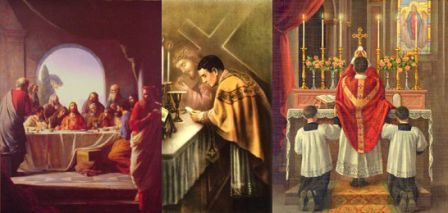
The priest repeats the what our Lord told us during the last supper on the night before he suffered and died. At the moment the words "took bread" are spoken, he takes the host into his hands and makes the sign of the cross as he says " blessed it".
| ORDO MISSAE | ORDINARY OF THE MASS |
| P: Qui pridie quam pateretur, accepit panem in sanctas ac venerabiles manus suas: et elevatis oculis in coelum ad te Deum Patrem suum omnipotentem, tibi gratias agens, benedixit `†´, fregit, deditque discipulis suis, dicens: Accipite et manducate ex hoc omnes: | P: Who, the day before He suffered, took bread into His holy and venerable hands, and having lifted up His eyes to heaven, to Thee, God, His almighty Father, giving thanks to Thee, blessed it `†´, broke it, and gave it to His disciples, saying: Take ye and eat ye all of this: |
The priest then bends over the Host and, standing in persona Christi, makes this most solemn pronouncement:
| ORDO MISSAE | ORDINARY OF THE MASS |
| HOC EST ENIM CORPUS MEUM. | FOR THIS IS MY BODY. |
Then the priest adores and elevates the now Sacred Host High enough for everyone to see, and the bell is rung.
Traditional Latin Tridentine Mass
Consecration Of The Wine
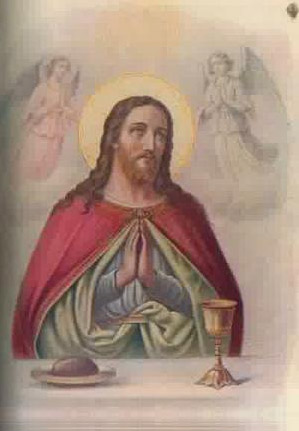
The priest then uncovers the Chalice and says:
| ORDO MISSAE | ORDINARY OF THE MASS |
| P: Simili modo postquam coenatum est, accipiens et hunc praeclarum Calicem in sanctas ac venerabiles manus suas: item tibi gratias agens, benedixit `†´, deditque discipulis suis, dicens: Accipite et bibite ex eo omnes: | P: In like manner, after He had supped, taking also into His holy and venerable hands this goodly chalice again giving thanks to Thee, He blessed it `†´, and gave it to His disciples, saying: Take ye, and drink ye all of this: |
The priest then bends over the Chalice and, standing in persona Christi, makes this most solemn pronouncement:
| ORDO MISSAE | ORDINARY OF THE MASS |
| HIC EST ENIM CALIX SANGUINIS MEI, NOVI ET AETERNI TESTAMENTI: MYSTERIUM FIDEI, QUI PRO VOBIS ET PRO MULTIS EFFENDETUR IN REMISSIONEM PECCATORUM. | FOR THIS IS THE CHALICE OF MY BLOOD, OF THE NEW AND EVERLASTING TESTAMENT, THE MYSTERY OF FAITH, WHICH FOR YOU AND FOR MANY SHALL BE SHED UNTO THE REMISSION OF SINS. |
| P: Haec quotiescumque feceritis in mei memoriam facietis. | P: As often as ye shall do these things, ye shall do them in memory of Me. |
The priest then adores and elevates the now Sacred Cup high enough for everyone to see, and the bell is rung.
Salvation History Recalled
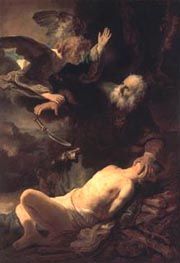
In the following prayer, Christ's Passion is called to mind as well as his Resurrection and Ascension. Then follows a prayer asking that God accept our sacrifice as he did in pre-Christian times for Abel, Abraham and Melchisedech. Their sacrifices were pleasing to the Lord for various reasons. Abel because he offered himself as a good servant, Abraham because he was willing to give what was most dear to him and Melchisedech because his was given with thanks. The word "Eucharist" is Greek for "thanksgiving". Also called to remembrance are our martyrs, sinners and the dead.
The priest continues:
| ORDO MISSAE | ORDINARY OF THE MASS |
| P: Unde et memores Domine, nos servi tui, sed et plebs tua sancta, ejusdem Christi Filii tui Domini nostri tam beatae passionis, nec non et ab inferis resurrectionis, sed et in coelos gloriosae ascensionis: offerimus praeclarae majestati tuae de uis donis ac datis, hostiam `†´ puram, hostiam `†´ sanctam, hostiam `†´ immaculatam, Panem `†´ sanctum vitae aeternae, et Calicem `†´ salutis perpetuae. | P: Wherefore, O Lord, we, Thy servants, as also Thy holy people, calling to mind the blessed passion of the same Christ, Thy Son, our Lord, His resurrection from the grave, and His glorious ascension into heaven, offer up to Thy most excellent majesty of Thine own gifts bestowed upon us, a victim `†´ which is pure, a victim `†´ which is stainless, the holy bread `†´ of life everlasting, and the chalice `†´ of eternal salvation. |
| P: Supra quae propitio ac sereno vultu respicere digneris: et accepta habere, sicuti accepta habere dignatus es munera pueri tui justi Abel, et sacrificium patriarchae nostri Abraham: et quod tibi obtulit summus sacerdos tuus Melchisedech, sanctum sacrificium, immaculatam hostiam. | P: Vouchsafe to look upon them with a gracious and tranquil contenance, and to accept them, even as Thou wast pleased to accept the offerings of Thy just servant Abel, and the sacrifice of Abraham, our patriarch, and that which Melchisedech, Thy high priest, offered up to Thee, a holy sacrifice, a victim without blemish. |
| P: Supplices te rogamus, omnipotens Deus; jube haec perferri per manus sancti Angeli tui in sublime altare tuum, in conspectu divinae majestatis tuae: ut quotquot ex hac altaris participatione, sacrosanctum Filii tui Corpus `†´ et Sanquinem `†´ sumpserimus omni benedictione coelesti et gratia repleamur. Per eumdem Christum Dominum nostrum. Amen. | P: We humbly beseech Thee, almighty God, to command that these our offerings be borne by the hands of Thy holy angel to Thine altar on high in the presence of Thy divine Majesty; that as many of us as shall receive the most sacred `†´ Body and `†´ Blood of Thy Son by partaking thereof from this altar may be filled with every heavenly blessing and grace: Through the same Christ our Lord. Amen. |
Commemoration of the dead
| ORDO MISSAE | ORDINARY OF THE MASS |
| P: Memento etiam, Domine, famulorum famularumque tuarum "N." et "N." qui nos praecesserunt cum signo fidei, et dormiunt in somno pacis. | P: Be mindful, also, O Lord, of Thy servants N. and N., who have gone before us with the sign of faith and who sleep the sleep of peace. |
| P: Ipsis Domine, et omnibus in Christo quiescentibus, locum refrigerii, lucis et pacis, ut indulgeas, deprecamur, per eumdem Christum Dominum nostrum. Amen. | P: To these, O Lord, and to all who rest in Christ, grant, we beseech Thee, a place of refreshment, light, and peace. Through the same Christ our Lord. Amen. |
The priest strikes his breast, saying:
| ORDO MISSAE | ORDINARY OF THE MASS |
| P: Nobis quoque peccatoribus famulis tuis, de multitudine miserationum tuarum sperantibus, partem aliquam et societatem donare digneris, cum tuis sanctis Apostolis et Martyribus: cum Joanne, Stephano, Matthia, Barnaba, Ignatio, Alexandro, Marcellino, Petro, Felicitate, Perpetua, Agatha, Lucia, Agnete, Caecilia, Anastasia, et omnibus sanctis tuis: intra quorum nos consortium, non aestimator meriti, sed veniae, quaesumus, largitor admitte. Per Christum Dominum nostrum. | P: To us sinners, also, Thy servants, who put our trust in the multitude of Thy mercies, vouchsafe to grant some part and fellowship with Thy holy apostles and martyrs; with John, Stephen, Matthias, Barnabas, Ignatius, Alexander, Marcellinus, Peter, Felicitas, Perpetua, Agatha, Lucy, Agnes, Cecilia, Anastasia, and with all Thy saints. Into their company do Thou, we beseech Thee, admit us, not weighing our merits, but freely pardoning our offenses: through Christ our Lord. |
| P: Per quem haec omnia, Domine, semper bona creas, sanctificas `†´, vivificas `†´, benedicis `†´ et praestas nobis. | P: By Whom, O Lord, Thou dost always create, sanctify `†´, quicken `†´, bless `†´, and bestow upon us all these good things. |
| P: Per ipsum `†´, et cum ipso `†´, et in ipso `†´, est tibi Deo Patri `†´ omnipotenti, in unitate tus `†´ Sancti, omnis honor et gloria. | P: Through Him `†´, and with Him `†´, and in Him `†´, is to Thee, god the Father `†´ almighty, in the unity of the Holy `†´ Ghost, all honor and glory. |
The priest then raises his voice and says:
| ORDO MISSAE | ORDINARY OF THE MASS |
| P: Per omnia saecula saeculorum. Amen. | P: World without end. Amen. |
The Pater Noster
The "Our Father" is the prayer of the faithful which our Lord Jesus Christ taught His Apostles when they asked Him how they should pray. The priest follows it with a prayer for our deliverance and protection.
| ORDO MISSAE | ORDINARY OF THE MASS |
| P: Oremus. Praeceptis salutaribus moniti, et divina institutione formati, audemus dicere: | P: Let us pray. Admonished by salutary precepts, and following divine directions, we presume to say: |
| P: Pater noster, qui es in coelis: sanctificetur nomen tuum: adveniat regnum tuum: fiat voluntas tua sicut in coelo et in terra. Panem nostrum quotidianum da nobis hodie: et dimitte nobis debita nostra, sicut et nos dimittimus debitoribus nostris. Et ne nos inducas in tentationem. Sed libera nos a malo. Amen. | P: Our Father, Who art in heaven, hallowed be Thy name; Thy kingdom come; Thy will be done on earth as it is in heaven; give us this day our daily bread; and forgive us our trespasses, as we forgive those who trespass against us, and lead us not into temptation. But deliver us from evil. Amen. |
| P: Libera nos, quaesumus Domine, ab omnibus malis praeteritis, praesentibus, et futuris: et intercedente beata et gloriosa semper Virgine Dei Genitrice Maria, cum beatis Apostolis tuis Petro at Paulo, atque Andrea, et omnibus sanctis, da propitius pacem in diebus nostris: ut ope misericordiae tuae adjuti, et a peccato simus semper liberi, et ab omni perturbatione securi. | P: Deliver us, we beseech Thee, O Lord, from all evils, past, present, and to come: and by the intercession of the blessed and glorious Mary, ever a virgin, Mother of God, and of Thy holy apostles Peter and Paul, of Andrew, and of all the saints, graciously grant peace in our days, that through the help of Thy bountiful mercy we may always be free from sin and secure from all disturbance. |
Traditional Latin Tridentine Mass
Breaking of the Bread (Fracto Panis)
Breaking of the Bread (Fracto Panis)

The priest breaks the consecrated Sacred Host, saying:
| ORDO MISSAE | ORDINARY OF THE MASS |
| P: Per eumdem Dominum nostrum Jesum Christum Filium tuum. Qui tecum vivit et regnat in unitate Spiritus Sancti Deus. Per omnia saecula saeculorum. | P: Through the same Jesus Christ, Thy Son, our Lord, Who liveth and reigneth with Thee in the unity of the Holy Ghost, God, World without end. |
| S: Amen. | S: Amen. |
| P: Pax `†´ Domini sit `†´ semper vobiscum `†´. | P: May the peace `†´ of the Lord `†´ be always with `†´ you. |
| S: Et cum spiritu tuo. | S: And with thy spirit. |
The priest then drops a particle of the Sacred Host into the Chalice.
| ORDO MISSAE | ORDINARY OF THE MASS |
| P: Haec commixtio et consecratio Corporis at Sanguinis Domini nostri Jesu Christi fiat accipientibus nobis in vitam aeternam. Amen. | P: May this commingling and consecrating of the Body and Blood of Our Lord Jesus Christ avail us who receive it unto life everlasting. Amen. |
Traditional Latin Tridentine Mass
Lamb Of God (Agnus Dei)
Throughout both Testaments of the Bible our Lord is referred to in prophecy and in fact as the "Lamb of God". Before the New and Everlasting Covenant, lambs were used for sacrificial offerings. As humans would sacrifice lambs, God Himself graciously gave us His only Son as a sacrifice for our redemption.
Three prayers follow the Agnus Dei, preceeding the Communion prayer, which is based on the Roman centurion's plea for Christ to heal his ill servant.
Bowing down, the priest says:
| ORDO MISSAE | ORDINARY OF THE MASS |
| P: Agnus Dei, qui tollis peccata mundi, miserere nobis. Agnus Dei, qui tollis peccata mundi, miserere nobis. Agnus Dei, qui tollis peccata mundi, dona nobis pacem. | P: Lamb of God, Who takest away the sins of the world: have mercy on us. Lamb of God, Who takest away the sins of the world: have mercy on us. Lamb of God, Who takest away the sins of the world: grant us peace. |
| P: Domine Jesu Christe, qui dixisti Apostolis tuis: pacem relinquo vobis, pacem meam do vobis: ne respicias peccata mea, sed fidem Ecclesiae tuae; eamque secundum voluntatem tuam pacificare et coadunare digneris. Qui vivis et regnas Deus, per omnia saecula saeculorum. Amen. | P: O Lord Jesus Christ Who didst say to Thine apostles: Peace I leave you, My peace I give you: look not uon my sins, but upon the faith of Thy Church, and vouchsafe to grant her peace and unity according to Thy will: Who livest and reignest God, world without end. Amen. |
| P: Domine Jesu Christe, Fili Dei vivi, qui ex voluntate Patris cooperante Spritu Sancto, per mortem tuam mundum vivificasti: libera me per hoc sacrosanctum Corpus et Sanguinem tuum ab omnibus iniquitatibus meis et universis malis: et fac me tuis semper inhaerere mandatis: et a te nunquam separari permittas: qui cum eodem Deo Patre et Spiritu Sancto vivis et regnas Deus in saecula saeculorum. Amen. | P: O Lord Jesus Christ, Son of the living God, Who, according to the will of the Father, through the co-operation of the Holy Ghost, hast by Thy death given life to the world: deliver me by this Thy most Sacred Body and Blood from all my iniquities, and from every evil; make me always cleave to Thy commandments, and never suffer me to be separated from Thee, Who with the same God, the Father and the Holy Ghost, livest and reignest God, world without end. Amen. |
| P: Perceptio Corporis tui, Domine Jesu Christe, quod ego indignus sumere praesumo, non mihi proveniat in judicium et condemnationem: sed pro tua pietate prosit mihi ad tutamentum mentis et corporis, et ad medelam percipiendam. Qui vivis et regnas cum Deo Patre in unitate Spiritus Sancti Deus, per omnia saecula saeculorum. Amen. | P: Let not the partaking of Thy Body, O Lord Jesus Christ, which I, all unworthy, presume to receive, turn to my judgement and condemnation; but through Thy loving kindness may it be to me a safeguard and remedy for soul and body; Who, with God the Father, in the unity of the Holy Ghost, livest and reignest, God, world without end. Amen. |
Traditional Latin Tridentine Mass
The Communion
The priest genuflects, rises and says:
| ORDO MISSAE | ORDINARY OF THE MASS |
| P: Panem coelestem accipiam et nomen Domini invocabo. | P: I will take the bread of heaven, and will call upon the name of the Lord. |
Taking the Sacred Host with his left hand, the priest repeats this prayer three times, strikes his breast each of the three times, and the bell is rung each of the three times.
| ORDO MISSAE | ORDINARY OF THE MASS |
| P: Domine, non sum dignus ut intres sub tectum meum: sed tantum dic verbo, et sanabitur anima mea (three times). | P: Lord, I am not worthy that Thou shouldst enter under my roof; but only say the word, and my soul shall be healed. (three times) |
Traditional Latin Tridentine Mass
Communion of the Faithful
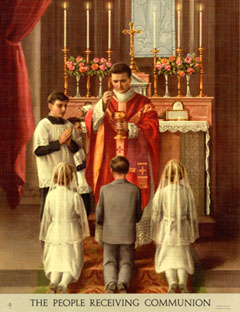
The consecrated bread and wine are now in substance the body, blood, soul and divinity of our Lord Jesus Christ. The priest has placed a small piece of the consecrated Host into the Chalice and prayed that those who receive it may have eternal life.
He recited the Agnus Dei which - as prophesized from the Old Testament to Revelations - signifies Jesus Christ our only Redeemer as being the sacrificial lamb of God. Then he repeated the prayer of the Roman centurion who wanted to show his faith that Christ could heal his sick servant.
As the priest places a Host directly from the paten into the mouth of each communicant, he prays for life everlasting.
To continue -
Holding the Sacred Host in his right hand, the priest makes the sign of the cross with it and says:
| ORDO MISSAE | ORDINARY OF THE MASS |
| P: Corpus Domini nostri Jesu Christi custodiat animam meam in vitam aeternam. Amen. | P: May the Body of Our Lord Jesus Christ keep my soul unto life everlasting. Amen. |
The priest himself then receives Holy Communion and after a brief meditation continues:
| ORDO MISSAE | ORDINARY OF THE MASS |
| P: Quid retribuam Domino pro omnibus quae retribuit mihi? Calicem salutaris accipiam, et nomen Domini invocabo Dominum, et ab inimicis meis salvus ero. | P: What shall I render unto the Lord for all the things that He hath rendered unto me? I will take the chalice of salvation and will call upon the name of the Lord. With high praises will I call upon the Lord, and I shall be saved from all mine enemies. |
The priest takes the Chalice in his right hand and makes the sign of the cross, saying:
| ORDO MISSAE | ORDINARY OF THE MASS |
| P: Sanguis Domini nostri Jesu Christi custodiat animam meam in vitam aeternam. Amen. | P: May the Blood of Our Lord Jesus Christ keep my soul unto life everlasting. Amen. |
The priest himself then drinks of the cup, and after a brief meditation continues:
Here the server recites the Confiteor in the name of the communicants, and the priest responds with the Misereatur and the Indulgentiam.
The priest faces the people holding the Ciborium and, holding up one of the Sacred Particles before all of the communicants, says:
| ORDO MISSAE | ORDINARY OF THE MASS |
| P: Ecce Agnus Dei, ecce Qui tollit peccata mundi. | P: Behold the Lamb of God, behold Him who taketh away the sins of the world. |
| R: Domine, non sum dignus, ut intres sub tectum meum: sed tantum dic verbo, et sanabitur anima mea. (Repeated three times.) | R: Lord, I am not worthy that Thou shouldst enter under my roof; but only say the word, and my soul shall be healed. (Repeated three times.) |
Here the lay communicants come forward to the Communion rail to receive our Lord in the Sacrament of Holy Communion.
Communion of the Faithful
The priest gives Holy Communion to each communicant saying:
| ORDO MISSAE | ORDINARY OF THE MASS |
| P: Corpus Domini nostri Jesu Christi custodiat animam tuam in vitam aeternam. | P: May the Body of Our Lord Jesus Christ keep your soul unto life everlasting. |
| R: Amen. | R: Amen. |
When all have received Communion, the priest returns to the altar and replaces the Ciborium in the tabernacle. He then receives wine in the Chalice and says:
| ORDO MISSAE | ORDINARY OF THE MASS |
| P: Quod ore sumpsimus Domine, pura mente capiamus: et de munere temporali fiat nobis remedium sempiternum. | P: Into a pure heart, O Lord, may we receive the heavenly food which has passed our lips; bestowed upon us in time, may it be the healing of our souls for eternity. |
The priest then goes to the Epistle (right) side of the Alar, and, while as the server pours wine and water over his fingers, he says:
| ORDO MISSAE | ORDINARY OF THE MASS |
| P: Corpus tuum, Domine, quod sumpsi, et Sanguis, quem potavi, adhaereat visceribus meis: et praesta, ut in me non remaneat scelerum macula, quem pura et sancta refecerunt sacramenta. Qui vivis et regnas in saecula saeculorum. Amen. | P: May Thy Body, O Lord, which I have received, and Thy Blood which I have drunk cleave to mine inmost parts: and do Thou grant that no stain of sin remain in me, whom pure and holy mysteries have refreshed: Who livest and reignest world without end. Amen. |
The Communion Prayer
| ORDO MISSAE | ORDINARY OF THE MASS |
| P: Dominus vobiscum. | P: May the Lord be with you. |
| S: Et cum spiritu tuo. | S: And with thy spirit. |
At the Epistle side, the priest recites the Communion Prayer appropriate for the Mass being celebrated.
The Post-Communion
from the Epistle (right) side of the altar, the priest recites the appropriate Post-communion prayer for the Mass being celebrated.
The post communion prayers change from day to day as do the communion prayers. The Latin derivation of the phrase "Ite missa est" denotes that we are sent on our mission to spread the Gospel, as Christ instructed His apostles before the ascension.
The priest returns to the center, kisses the altar, turns toward the people says:
| ORDO MISSAE | ORDINARY OF THE MASS |
| P: Dominus vobiscum. | P: The Lord be with you. |
| S: Et cum spiritu tuo. | S: And with thy spirit. |
| P: Ite, missa est. | P: Go, the mass is ended. |
| S: Deo gratias. | S: Thanks be to God. |
The priest bows over the altar and recites the following prayer which is known as the "Placeat", which summarizes the intention of the entire mass.
| ORDO MISSAE | ORDINARY OF THE MASS |
| P: Placeat tibi sancta Trinitas, obsequium servitutis meae; et praesta, ut sacrificium, quod oculis tuae majestatis indignus obtuli, tibi sit acceptabile, mihique et omnibus, pro quibus illud obtuli, sit, te miserante, propitiabile. Per Christum Dominum nostrum. Amen. | P: May the lowly homage of my service be pleasing to Thee, O most holy Trinity: and do Thou grant that the sacrifice which I, all unworthy, have offered up in the sight of Thy majesty, may be acceptable to Thee, and, because of Thy loving kindness, may avail to atone to Thee for myself and for all those for whom I have offered it up. Through Christ our Lord. Amen. |
Traditional Latin Tridentine Mass
The Blessing
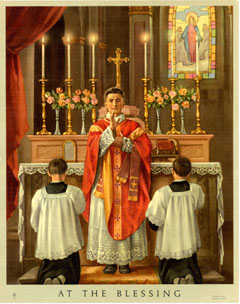
The priest kisses the altar, and at the word "Pater", turns toward the people, blesses them, saying:
| ORDO MISSAE | ORDINARY OF THE MASS |
| P: Benedicat vos omnipotens Deus, Pater, et Filius `†´, et Spiritus Sanctus. | P: May almighty God, the Father, and the Son `†´, and the Holy Ghost, bless you. |
| S: Amen. | S: Amen. |
Traditional Latin Tridentine Mass
The Last Gospel
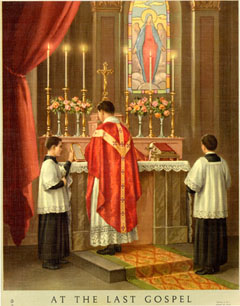
Now said in full at the altar, the Last Gospel was once a private prayer the priest would recite to himself as he went from the altar to the sacristy. Although most priests know it by heart, there is always a large card with the full text in its place on the altar.
During certain feasts, there may be a special Last Gospel but usually it will be the first fourteen verses from the Gospel of Saint John.
The priest now goes to the Gospel (left) side of the altar; he makes the sign of the cross, first upon the altar, and then upon his forehead, lips, and heart, and then he reads the Last Gospel:
| ORDO MISSAE | ORDINARY OF THE MASS |
| P: Dominus vobiscum. | P: The Lord be with you. |
| S: Et cum spiritu tue. | S: And with thy spirit. |
| P: Initium sancti Evangelii secundum Joannem. | P: The beginning of the holy Gospel, according to St. John. |
| P: In prinicipio erat Verbum, et Verbum erat apud Deum, et Deus erat Verbum. Hoc erat in principio apud Deum. Omnia per ipsum facta sunt, et sine ipso factum est nihil quod factum est. In ipso vita erat, et vita erat lux hominum: et lux in tenebris lucet, et tenebrae eam non comprehenderunt. Fuit homo missus a Deo, cui nomen erat Joannes. Hic venit in testimonium, ut testimonium perhiberet de lumine, ut omnes crederent per illum. Non erat ille lux, sed ut testimonium perhiberet de lumine. Erat lux vera quae illuminat omnem hominem venientem in hunc mundum. In mundo erat, et mundus per ipsum factus est, et mundus eum non cognovit. In propria venit, et sui eum non receperunt. Quotquot autem receperunt eum, dedit eis potestatem filios Dei fieri, his qui credunt in nomine ejus. Qui non ex sanguinibus, neque ex voluntate carnis, neque ex voluntate viri, sed ex Deo nati sunt. (Here all genuflect) ET VERBUM CARO FACTUM EST, et habitavit in nobis et vidimus gloriam ejus, gloriam quasi unigeniti a Patre, plenum gratiae et veritatis. | P: In the beginning was the Word, and the Word was with God, and the Word was God. The same was in the beginning with God. All things were made by Him, and without Him was made nothing that was made. In Him was life, and the life was the light of men: and the light shineth in darkness, and the darkness did not comprehend it. There was a man sent from God, whose name was John. This man came for a witness to give testimony of the light, that all men might believe through him. He was not the light, but was to give testimony of the light. That was the true light which enlighteneth every man that cometh into this world. He was in the world, and the world was made by Him, and the world knew Him not. He came unto His own, and His own received Him not. But as many as received Him, to them He gave great power to become the sons of God: to them that believe in His name: who are born, not of blood, nor of the will of the flesh, nor of the will of man, but of God. And (Here all genuflect) THE WORD WAS MADE FLESH, AND DWELT AMONG US, and we saw His glory, the glory as of the only begotten of the Father, full of grace and truth. |
| S: Deo gratias. | S: Thanks be to God. |
Traditional Latin Tridentine Mass
Prayers after Low Mass
After Low Mass, the priest kneels at the altar steps and says the folowing prayers with the people:
The Ave Maria
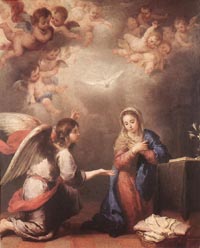
| Ave Maria, gratia plena, Dominus tecum. Benedicta tu in mulieribus, et benedictus fructus ventris tui, Jesus. Sancta Maria, Mater Dei, ora pro nobis peccatoribus, nunc, et in hora mortis nostrae. Amen. (Repeat three times.) | Hail Mary, full of grace, the Lord is with thee. Blessed art thou amongst women, and blessed is the fruit of thy womb, Jesus. Holy Mary, Mother of God, pray for us sinners, now, and at the hour of our death. Amen. (Repeat three times.) |
The Salve Regina
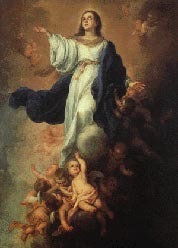
| Salve Regina, Mater misericordiae. Vita, dulcedo, et spes nostra, salve. Ad te clamamus exsules filii Hevae. Ad te Suspiramus, gementes et flentes in hac lacrimarum valle. Eja ergo, Advocata nostra, illos tuos misericordes oculos ad nos converte. Et Jesum, benedictum a fructum ventris tui, nobis post hoc exsilium ostende. O clemens, o pia, o dulcis Virgo Maria. | Hail, holy Queen, Mother of mercy, our life, our sweetness, and our hope! To thee do we cry, poor banished children of Eve, to thee do we send up our sighs, mourning and weeping in this valley of tears. Turn then, most gracious Advocate, thine eyes of mercy towards us, and after this our exile show unto us the blessed fruit of thy womb, Jesus. O clement, O loving, O sweet virgin Mary. |
| P: Ora pro nobis, sancta Dei Genitrix. | Pray for us, O holy Mother of God. |
| S: Ut digni efficiamur promissionibus Christi. | S: That we be made worthy of the promises of Christ. |
| P: Oremus. Deus refugium nostrum et virtus, populum ad te clamantem propitius respice; et intercedente gloriosa et immaculata Virgine Dei Genitrice Maria, cum beato Josepho ejus Sponso, ac beatis Apostolis tuis Petro et Paulo, et omnibus Sanctis, quas pro conversione peccatorum, pro libertate et exaltatione sanctae Matris Ecclesiae, preces effundimus, misericors et benignus exaudi. Per eumdem Christum Dominum nostrum. Amen. | P: Let us pray. O God, our refuge and our strength, look down with favor upon Thy people who cry to Thee; and through the intercession of the glorious and immaculate Virgin Mary, Mother of God, of her spouse, blessed Joseph, of Thy holy apostles, Peter and Paul, and all the saints, mercifully and graciously hear the prayers which we pour forth to Thee for the conversion of sinners and for the liberty and exaltation of holy mother Church. Through the same Christ our Lord. Amen. |
Saint Michael the Archangel
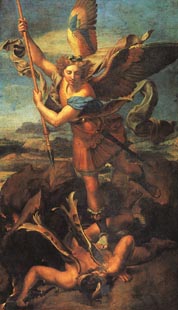
| Sancte Michael Archangele, defende nos in praelio. Contra nequitiam et insidias diaboli esto praesidium. Imperet illi Deus, supplices deprecamur. Tuque princeps militiae caelestis, Satanam aliosque spiritus malignos, qui ad perditionem animarum pervagantur in mundo divina virtute in infernum detrude. Amen. | St. Michael, the archangel, defend us in battle. Be our protection against the malice and snares of the devil. We humbly beseech God to command him. And do thou, O prince of the heavenly host, by the divine power thrust into hell Satan and the other evil spirits who roam through the world seeking the ruin of souls. Amen. |
The Invocation after Mass
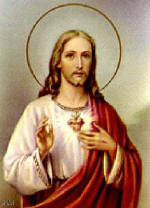
| P: Cor Jesu sacratissimum, | P: Most Sacred Heart of Jesus. |
| S: Miserere nobis. | S: Have mercy on us! |
| (Repeat three times.) | (Repeat three times.) |
What this page attempts to capture in some small way is the invaluable, golden treasure of the Latin Liturgy that we almost lost, and that so many of today's Catholics have never even seen. That it came so close to completely disappearing should be a shocking warning to all of our brothers in the various Catholic Eastern Rites in full communion with Rome, and to our separated brothers in the Eastern, Greek and Russian Orthodox Churches that are not in full communion with Rome. If you have ever witnessed first hand, or seen on TV, any Mass of any of these ancient Christian confessions, then you know what I'm talking about: Sheer Majesty in Liturgy. Liturgical beauty, so glorious and majestic that it can bring a grown man to tears.
This is what we almost lost, and it needs to be re-recognized by today’s laymen as possibly the most glorious and inspirational Earthly thing existing today. It has been the primary source and inspiration of the greatest classical art ever produced, and of the greatest classical music ever written. Nothing in this world today can be as consistently uplifting of the human spirit as the ancient Latin Mass, or any of the Eastern Rite variants. It is not possible to properly glorify God, praise Him and give Him thanks, as is done in this Liturgy, without simultaneously lifting our own spirits to new heights.
The most important part of the Mass – actual, physical Communion with Divinity Himself – is put into most proper human perspective when surrounded by the beauty and majesty of the ancient forms of the Mass.
May it continue to survive all non-magisterial attempts to “tone it down” or “improve” or “reform” it, and may it continue to be the Church’s most valuable tool of inspiration and evangelization.
Sarcastic Acronym Hover-Link Footnotes: For the convenience of those readers using devices that lack a mouse, these footnotes are provided for all webpages, in case any webpage contains any hover-links. (If you don't have a mouse, you can't "hover" it over a link without clicking just to see the simple acronym interpretation. Click any footnote link to see the acronym and a detailed explanation; "Hover" the mouse over it just to see the simple interpretation.)
SLIMC1 Secularist Liberal Intellectual Media ComplexGESGOEAEOT2 Gradually, Ever So Gradually, Over Eons And Eons Of Time
PEWAG3 Punctuated Equilibrium's Wild-Assed Guess
TTRSTF4 Them There Real Scientifical-Type Fellers
TTRSPTF5 Them There Real Smart Perfesser-Type Fellers
TTRSJTF6 Them There Real Smart Journalistical-Type Fellers
SNRTACBT7 Surely No Right Thinking Adult Could Believe Today
STNSEACPB8 Surely Today No Serious Educated Adult Could Possibly Believe
WDN9 We Don't Know
BMDFP10 Baboons, Mongrel Dogs, Filthy Pigs and ...
HBAACOTE11 Human Beings Are A Cancer On The Earth
ACLU12 Anti-Christian Litigation Union
FLORMPORIF13 Flagrant Liar, Or, Mindless Parrot, Or, Innocent Fool
MEJTML14 Marxist Ends-Justify-The-Means Liar
IEJTML15 Islamic Ends-Ends-Justify-The-Means Liar MPAV16 Marxist Principles And Values
WBESSWG17 Wise, Benign, Elite, Super-Scientific World Governance
TRMITM18 The Reason Man's In This Mess
IYI19 Intellectual Yet Idiotic
TTRSCBTF20 Them There Real Smart Catholic Bishop Type Fellers
IACMPVND21 Illegal-Alien-Criminal Marxocrat-Party-Voting Nation-Destroyers
PEJTML22 Palestinian Ends-Justify-The-Means Liar
PSYOP23 "Psychological Operation" Mind Trick
CDC24 Covid Developmentally Challenged
LGBTQ+25 Every Letter Represents A Serious Psychotic sexual Identity Disorder
[All Web Pages listed in Site Map by date-of-publication;
oldest at the top, newest at the bottom of the list.]
Culture=Religion+Politics; Who Are We? Vic Biorseth
The Brilliantly Conceived Organization of the USA; Vic Biorseth
Return to the BLOG page
Return to the HOME PAGE
Subscribe to our Free E-Zine News Letter
 Long Live Israel Long Live Israel |
 Long Live Ukraine Long Live Ukraine |
 Long Live Taiwan Long Live Taiwan |
 Long Live South Korea Long Live South Korea |
Comment
Respond to this WebPage immediately below the last comment.
Or,
Date: Thu Sep 18 14:44:43 2008
From: Tom, in Roselle, IL, USA
Email: jazzfusion981@yahoo.com
Subject: Rosaries at Mass
Comment:
You "Shuddered" at the thought of having a rosary at the mass. Is this a problem? If so, why?
Date: Thu Sep 18 18:17:20 2008
From: Vic
Subject: Rosaries at Mass
Comment:
Tom:
Good question.
That was just a little sarcasm, aimed at Liberal Liturgists, including some of my teachers in the Athenaeum of Ohio LPMP program, who were horrified, horrified, at the thought that, once upon a time, laymen were seen actually praying the rosary in the pews during Mass. Some used this as evidence that people were not really paying attention, and participating in the liturgy as much as the Liberal Liturgists insisted that we all should. This is to say, every single second of the Mass. It is my contention that full attention is not an absolute requirement during the longer prayers of the priest, which, after all, are said by him on our behalf.
Regards,
Vic
Date: Wed Dec 10 13:02:06 2008
From: Michael Reverie
Email: hummerc117@aol.com
Subject: Where to find the Latin Mass
Comment:
My job requires that I fly often and to different areas of the country. Tell me the Churches and cities of the U.S. which perform the Traditional Latin Tridentine Mass.
Mike
Date: Thu Dec 11 06:11:38 2008
From: Vic
Subject: Where to find the Latin Mass
Comment:
Mike:
Locations and times for the Latin Mass may be found at this link:
Ecclesia Dei (Opens in a New Window)Just in case there’s no Latin Mass offered where you’re scheduled to go, general Mass times and places may be found at this link:
http://www.masstimes.org/dotnet/Default.aspx
(I just discovered the above link is no longer operable, so I changed it to a cut-and-paste link.)
If you have a portable GPS, just put the address in and it will take you right there. Give thanks to the Lord that you have a rent-a-car or other transportation to get you there. When I was driving “over-the-road” there was no way that I could get a big truck into the small neighborhoods where almost all of these Churches are located, nor could I get a legal place to park, or even room to turn around without severely damaging blacktop. Contrary to popular belief, churches cannot always send someone out to bring you to Mass from some truck stop or rest area, on short notice.
A trucker cannot leave his truck or cargo unattended except for very short times; even meals should be within sight of the rig. We cannot drop a trailer and “bobtail” (driving tractor only) because that puts the trailer and cargo at risk. Drivers sleep on their trucks, and some of us even eat on our trucks.
I give thanks to God every day now that I’m driving for a company that gets me home every day, and that I’m off every weekend. Besides missing many major family events – funerals, weddings, reunions, holidays – I missed Mass almost every Sunday, and every Holy Day. Attending the various Protestant services and Bible study groups available at a lot of truck stops just didn’t satisfy my Catholic hunger for Catholic Sacrament, Eucharist and Liturgy. Now, I feel like a real Catholic again.
At a lot Churches offering the Latin Mass, often the Latin Mass will be only one of several Masses offered that day, and sometimes there is only one (or none) on non-Sunday Holy Days. I pray that your work schedule won’t conflict with Mass times. Do your very best; He understands.
Regards,
Vic
Date: Thu Jul 16 16:50:13 2009
From: JEdwin
Email: josephthur@yahoo.com
Location: Euclid, Ohio, USA
Comment:
The rosary is a private devotion. The Mass always has the proverbial trump card in priority and in importance.
It is not a matter of right or wrong, but one similar to the Mary-Martha conundrum: While one was busy doing her thing, the other was giving her full attention to Christ who is present.
Praying the rosary or any other devotional is basically saying that the presence of Christ is not as important.
Date: Thu Jul 16 19:51:42 2009
From: Vic Biorseth
Comment:
JEdwin:
Agreed.
To rather poorly paraphrase an old TV series, there are eight million Catholics in the Naked City; and every one of them is a little bit different.
One who prays poorly may be better off than one who prays not at all. One who attends Mass poorly may be better off than one who is not present. One who thinks about holy things may be better off than one who denies Divinity. I wish everyone would pray perfectly, but I’ll take what I can get.
For all I know, some of these who are (or who appear to be) poor at prayer may wind up in a higher place than me.
Regards,
Vic
Date: Sun Aug 02 20:31:28 2009
From: Richard Quinn
Email: richardequinn@hotmail.com
Location: 419 Park Blvd S Venice, Florida 34285
Comment:
Please, where can I find a site, cd, anything audio, to pronounce the Latin responses. I must teach my sons this true Mass it's so beautiful. We attend "Christ the King " in Sarasota, Florida with FSSP Priest's. Thank you.
Date: Mon Aug 03 06:21:21 2009
From: Vic Biorseth
Comment:
Richard: Google “teaching Latin audio” or “learn Latin audio” and you should get a lot of hits.
Regards,
Vic
Date: Oct 11 19:40:43 2009
From: Richard E Quinn
Email: richardequinn@hotmail.com
Location: Venice,Florida USA
Comment:
This is the most Blessed Gift of the return of the "Latin Mass" and we are so Blessed here in the "Diocese of Venice" with the support of Bishop Frank J Dewane to have an all Latin Mass Church "Christ the King" with F.S.S.P. Priest's in Sarasota, Florida and spreading through out the Diocese. Thank you Bishop Dewane may God Bless you abundantly.
Date: Tue Jan 19 15:06:00 2010
From: Michael
Email:
Location: Charlotte/NC/USA
Comment:
JEdwin,
Great comment. You saved me the trouble.
Date: Thu Jan 28 20:35:23 2010
From: Nicole
Email:
Location: St. Louis MO
Comment:
This is truly a great explanation of the Latin Mass. Thank you so much for writing it down on this site. Here is a link to a group of priests who are performing the traditional Latin Mass throughout the U.S, Europe and in Gabon Africa:
Institute of Christ the King Sovereign Priest.
I attend Latin Mass at St. Francis de Sales in St. Louis MO. The music is so beautiful I am forced to hold back tears. I became Catholic when I was 18 and was unaware of this form of Mass. It was not until I was 25 that I discovered the Latin Mass. Now, at age 27, I can say I was truly missing out. If you are ever in St. Louis you should come and check out this mass. They have 2 French sisters who live in the convent next to the Rectory. At adoration they sing in front of the blessed Sacrament and it is so beautiful.
Date: Fri Jan 29 06:11:05 2010
From: Vic Biorseth
Comment:
Nicole:
We know what you mean. Any time we are in the St. Louis area we will find St Frances de Sales. We attended Christmas Midnight Mass in Michigan last year, at Assumption Grotto Church in Detroit, and it was an orchestral Mass, this one by Handl.
There is nothing in this world more glorious than the Latin Liturgy properly offered in a grand, majestic, architectural masterpiece, with a full orchestra participating. All the old masters wrote Masses; our favorite (so far) has been Beethoven’s Mass in D.
It makes us wish every Mass could be an orchestral Mass.
Regards,
Vic
Date: Sun May 09 00:58:10 2010
From: Jof
Email: jofma@aol.com
Location: Poughkeepsie, NY, USA
Comment:
It is very holy, but I do wish that we could at least hear the priest when he says the mass so we can follow in the missal.
Date: Mon Aug 06 20:49:20 2012
From: rendelle limbaco
Email: rendellelim@yahoo.com
Location: mambajao, camiguin, philippines
Comment:
It is a very solemn mass WE SHOULD PROMOTE AGAIN THIS MASS OF ALL TIMES.
From: Vic Biorseth
Date: Monday, September 03, 2012
Upgraded webpage to BB 2.0, SBI! 3.0 and maximized Reusable Code feature of new release. (LOVE this new release.)
Regards,
Vic
Date: Fri
Dec 07 14:08:23 2012
From: Ben Jennings
Email: benjennings1999@hotmail.co.uk
Location: Salford,Manchester,England
Comment:
I love the picture of the high mass.
Date: Wed Jan 16 06:51:33 2013
From: Tina
Email:
Location: Delaware
Comment:
I am blessed to be able to attend a TLM each Sunday. I agree that we do not need to know Latin to pray the traditional Latin Tridentine Mass. I can say, though, that I enjoy being able to understand some Latin. A fantastic (clear, easy to follow) DVD program is Latina Christiana from Memoria Press: http://www.memoriapress.com/descriptions/Latina1.html
The program is specifically oriented to teach "Christian Latin" (Church/ Ecclesiastical Latin), which differs in pronunciation from Classical Latin.
I have done LCI and LCII for homeschooling purposes (each is a semester class), and I can now follow along with the Latin side of the missal quite well. I think that even doing LCI alone would be very helpful.
Date: Mon Mar 25 15:29:04 2013
From: Prissy
Email: talktoprissy@yahoo.com
Location: Rural Tennessee USA
Comment:
Hello!
Can you PLEASE tell me what is the source for the series of vintage illustrations of the Mass (The Mass Begins, Epistle, etc.)? They are fantastic and would like to know where they came from so I may try to find it for purchase.
EVER THANKS!
Date: Mon Mar 25 20:10:24 2013
From: Vic Biorseth
Comment:
Prissy:
Good question! And now I wish I could answer it. Once upon a time, before I converted this page to the newest SBI! version, I think there were some three or four reference links at the bottom of the page before the link to the site references; somehow they got lost, either in the conversion or in some previous update. Now I can't find the original sources for the Latin, the English and the vintage imagery; perhaps those sites are not up any more. There were no copyrights attached, and any printed Missal(s) they originally came out of are way out of copyright and long out of print.
The "vintage" ones in particular caught my eye when I originally encountered them on-line, because I remember seeing them, or pictures just like them, in an old either Missal, or a Mass instruction document - I don't remember which - that I had when I was a boy. (I no longer have it.) My wife's oldest Missal is one she got for graduation in 1963, and it is a St. Joseph's Missal, with the "recently updated rubrics" of 1961. It has similar pictures, but not nearly as nice, and without the little subtitles below.
We have another very old children's illustrated Bible; nice pictures, but not any of these.
I just searched using Bing and Google, and didn't find them, or any of the sites I got them off of.
If you want them for a website or a blog, I'll be happy to sell them to you for the low low price of $0.00; use them in good health. If you want the original book they came out of, you will have to somehow search old vintage bookstores for old Missals, or maybe old Catechism texts. You might talk to older family members; there might be one sitting in an attic somewhere. If you find one, please let me know where.
Regards,
Vic
Date: Tue Mar 26 10:26:43 2013
From: Prissy
Email: talktoprisy@yahoo.com
Location: rural tn USA
Comment:
http://www.catholictradition.org/Priests/traditional-mass.htm
That is a fantastic link online of the pics, but would love to find out what the paper source is...
Thanks so much for your reply!
Date: Mon Apr 01 15:30:59 2013
From: Blaï
Email: blasecastor@yahoo.com
Location: Barcelona españa
Comment:
I recommend that anyone who has never been to a high latin mass go. It is the most uplifting experience EVER!
I've been going to novo ordos mass for the past 36 years. I was tired of going through the motions.
It's Monday and I can't wait to go to Latin mass this Sunday.
Date: Tue Mar 11 10:22:46 2014
From: Carl
Email:
Location: New Jersey/USA
Comment:
Vic -
Thanks for your work on this - very informative especially for those of us who have not attended a Latin Mass for quite some time. I have attended 3 recently and wish to educate myself on this form of liturgy.
God Bless.
Date: Tue Mar 11 2014
From: Vic Biorseth
Comment:
Carl:
Thank you; it was a labor of love.
Regards,
Vic
PS: I have corrected the typo in the Reference Material page; thank you for pointing it out. FYI, you may contact me at the bottom of any webpage on this website; it all comes to me. Blessings.
Date: Tue Jul 15 2014
From: Vic Biorseth
Comment:
Changes pursuant to changing the website URL
and name from
Thinking Catholic Strategic
Center to
Catholic American Thinker.
Pulled the trigger on the 301 MOVE IT option June 1, 2014. Working my way through all the webpages. .
Regards,
Vic
Date: Mon Oct 27 08:42:49 2014
From: Glenn47
Email: Legoglenn@yahoo.com
Location: Rockford, Il usa
Comment:
When the host is consecrated, why do the altar servers lift up the tail of the priest's vestments?
Date: Mon Oct 27 2014
From: Vic Biorseth
Comment:
Glenn47:
It's a practice continued from ancient times, begun with the earliest formal offerings of the Catholic Mass. The Chasuble is descended from an ancient Roman garment that was very heavy, very thick, very inflexible and quite restrictive of movement. It may have been a beautiful vestment, but impractical in some movements of the wearer. Genuflecting and rising, raising one's arms high, etc. Acolytes would assist the Priest by helping move the Chasuble for the Priest. So, today, it's just a hold over from an ancient tradition that remains in place.
Regards,
Vic
Date: Sun Nov 23 18:08:54 2014
From: MJH
Email: michael.horvath3@verizon.net
Location: Tampa, FL USA
Comment:
Are there special graces or indulgences bestowed on those attending a Latin High Mass ?
In other words, graces / indulgences above what one would receive at a Novis Ordo Mass.
Date: Sun Nov 23 2014
From: Vic Biorseth
Comment:
MJH:
No, in that regard it is the same as the Novus Ordo. Either form satisfies the requirement to participate in Sunday and Holy Day Mass.
For me, the Latin Mass is more attentive to God than to me; it is more fulfilling, for me, because I feel more like I am giving God His due, rather than going to "get something out of it". But, as a bonus, I do indeed get something out of it; it is more uplifting of the spirit.
Everything that is beautiful and majestic and God-oriented lifts the spirit and brings it closer to heaven than anything that is more community or man oriented. The Latin Mass is less of the world; the Novus Ordo is more worldly.
But that's just me.
Regards,
Vic
Date: Sun Jun 28 19:16:18 2015
From: lazy Catholic
Email: EATONGUITARS@HOTMAIL.COM
Location: ST. LOUIS MO USA
Comment:
How about printing this complete with photos? I would buy a few as I'm sure others would too~ I am not computer savy and as the name implies to lazy to figure it out or I might do it myself~ very, very interesting and great work! If I had one of these booklets in my pocket I might give the latin Mass a try ~ what do you think? if you or another reader makes one please contact me ! Thanks again.
Date: Sun Jun 28 2015
From: Vic Biorseth
Comment:
Lazy:
This webpage is for reading at home at a leisurely pace, to learn and understand before you go to Mass. What you are looking for is a Latin - English Missal. Put the words "Latin English Missal" in any search engine and you will find lots of different kinds available. Or, go to a Catholic book store or Church Supply store. The two Catholic Missals currently in use are for:
- The Ordinary Form, which is the Novus Ordo (New Order) Mass of Pope Paul VI, available with Latin and English on opposing pages.
- The Extraordinary Form, which is the 1962 Latin Mass of Pope John XXIII, available with Latin and English on opposing pages.
This webpage describes the Extraordinary Form Mass. Mass Missals are available that include all Daily, Sunday and Holy Day Masses, and shorter versions for only Sundays and Holy Days are also available. The Missals contain not only what you see in this webpage, but the Scripture readings for each specific day in the liturgical calendar, and also special readings for Saint days.
There are pamphlet versions called Missalettes published periodically to cover spans of dates, usually a whole liturgical year, available for use in the pews of just about any Catholic Church you are likely to find. You can pick up a Missalette, look up the day's date, follow along with the Mass for that specific day, and then leave the missalette there in the pew after Mass.
Regards,
Vic
Date: Tue Nov 10 07:49:53 2015
From: Irma
Email: irmag18@yahoo.com
Location: texas
Comment:
In St Elizabeth Ann Catholic church Houston Texas close to Hwy 6 and 529 there are Latin masses from Monday through Saturday and on Sundays in the FLC.
(See http://seascatholic.org/)
Date: Tue Nov 10 2015
From: Vic Biorseth
Comment:
Irma:
Thank you; I will also copy your comment to the Latin Mass Page so people looking for a Latin Mass around Houston will find it.
Regards,
Vic
Date: Mon Jun 12 17:55:49 2017
From: Mary Wenze
Email: rumaw@sbcglobal.net
Location: Belleville, IL
Comment:
Your explanation of the Mass is beautiful. As a cradle Catholic, I stopped going to the New Mass with the advent of Communion-in-the-hand and Eucharistic Ministers. It just didn't make sense that what so recently had been sacrilegious, now was recommended. I prayed and, what seemed miraculous, I heard of Archbishop Marcel Lefebvre.
When he consecrated bishops I prayed again and, again miraculously, I happened on a book, "The Mother of the King" by Henry J. Coleridge, S.J. published in 1886, in which in the chapter 'The Mystery of the Twelfth Year,' he explains that Jesus disobeyed his parents. He certainly could have asked them to stay with Him if He just wanted to teach. Instead, He said, "I must be about my Father's business." Only God could come up with such way to teach perfection in disobedience.
That is why the Archbishop disobeyed the Pope. What could be more "God's business" than training priests and saving the Mass of All Time? Consequently, I have no problem supporting the SSPX.
What baffles me is the total absence of any mention of the Archbishop and his missionary Society in articles about the return of the Traditional Mass. Without the courage of one man that Mass would have been obliterated, but Christ kept His promise, "I will be with you until the end of the world."
Without the struggles of the SSPX I could not have attended a beautiful Tridentine Mass in Savannah, GA on Pentecost.
Thank you for your dedication to the Mass.
Date: Tue Nov 28 15:24:07 2017
From: Historian
Email: miller.george@ameritech.net
Location: Farmington Hills, Michigan, USA
Comment:
I am a Catholic priest. Where do I find a video which would teach me how to celebrate a pre-Vatican II Mass? I know I saw one once on the Internet but I cannot locate it? Thank you for your help.
Date: Wed Nov 29 2017
From: Vic Biorseth
Comment:
Fr. Historian:
Try these:
Regards,
Vic
Date: Tue Mar 20 21:04:43 2018
From: Michael
Email: Michael.nkissoon@gmail.com
Location: Trinidad & Tobago
Comment:
I am from Trinidad and Tobago, a country where the only mass a can find is of Pope Paul VI. What should I do in such a case?
Date: Wed Mar 21 2018
From: Vic Biorseth
Comment:
Michael:
Go to Mass; it's a valid Mass. Meanwhile, make a formal request that a Latin Mass be made available in your diocese. On paper, at least, if Parishioners request the availability of a Latin Mass, the Bishop must provide one.
Regards,
Vic
Date: Sun Apr 08 2018
From: Vic Biorseth
Comment:
Everyone:
I highly recommend the website http://divinumofficium.com/ for an on-line Latin Mass Missal. You can print off the Mass for any day, take it to Mass, and avoid flipping pages in your cumbersome Missal between the Readings and the Propers and so forth. It must have been a huge undertaking to get the whole thing in there, for every day of the Liturgical Year. It puts the whole Low Mass right there in its entirety, for any date. .
Regards,
Vic
Date: Sat May 29 17:11:50 2021
From: Sharon Sharp
Email: sharps1109@yahoo.com
Location: Richmond, TX, USA
Comment:
Loved the illustrations shown of the TLM, and they stirred a memory from my first Missal as a child.
Found the exact illustrations in my "New Children's Missal dedicated to Saint Joseph Patron of the Universal Church", printed January 3, 1959 - printed by Catholic Book Publishing Co., New York
Glad to see this little book hasn't crumbled into dust by now!
Date: Sun May 30 2021
From: Vic Biorseth
Comment:
Sharon:
Great find! I know I had one just like it, but even earlier. It was a 'First Communion' issue. The boy's had black and the girl's had white zipper-close leather or leather-like covers with little pouches for the rosaries that came with them as a set.
Mine has either crumbled into dust, or just been lost to antiquity.
You have found something old become new again, to keep and cherish.
Regards,
Vic
Language and Tone Statement
Please note the language and tone of this monitored Website. This is not the place to just stack up vulgar one-liners and crude rejoinders. While you may support, oppose or introduce any position or argument, submissions must meet our high Roman Catholic and Constitutional American standards of Truth, logical rigor and civil discourse. We will not participate in merely trading insults, nor will we tolerate participants merely trading insults. Participants should not be thin-skinned or over sensitive to criticism, but should be prepared to defend their arguments when challenged. If you don't really have a coherent argument or counter-argument of your own, sit down and don't embarrass yourself. Nonsensical, obscene, blindly &doggedly anti-Catholic, anti-American, immoral or merely insulting submissions will not be published here. If you have something serious to contribute to the conversation, be prepared to back it up, keep it clean, keep it civil, and it will be published. We humbly apologize to all religious conservative thinkers for the need to even say these things, but the Hard Left is what it always was, the New Leftist Liberals are what they are, and the Internet is what it is.
"Clickbait" advertising links are not acceptable for posting here.
If
you fear intolerant Leftist repercussions, do not use your real name
and do not include email or any identifying information. Elitist Culturally Marxist Pure Authoritarians cannot and will not tolerate your freedom of speech or any opposition to their
rigid authoritarian, anti-equality, anti-life, anti-liberty,
anti-private-property, hedonistic, anti-Constitution, pro-Marxist, pro-Islam, pro-sodomy, pro-sin, anti-Catholic, anti-Christian, anti-Semitic, anti-male, sexist, anti-heterosexual, anti-white, racist, anti-Western,
anti-American, Globalist, anti-Nation, blatantly immoral, totally
intolerant and bigoted point of view. This Site will not publish their intolerant and unwavering screeds.
Copyrighted Material
Solopreneur Opportunity Links, for a
Solo Build It WebSite
Never be lukewarm.
Life itself demands passion.
He who is indifferent to God has already forfeited his soul.
He who is indifferent to politics has already forfeited his liberty.
In America, religion is not mere window dressing and citizenship is not a spectator sport. Do not allow our common destiny as a whole people to just happen without your input.
Seek the Truth; find the Way; live the Life; please God, and live forever.
All Published Articles
By Publication Date
Enter ye in at the narrow gate: for wide is the gate, and
Broad is the way that leadeth to destruction, and many there are who go in
thereat. How narrow is the gate, and strait is the way that leadeth to life:
and few there are that find it! Beware of false prophets, who come to you in
the clothing of sheep, but inwardly they are ravening wolves.
Jesus
Christ; Matthew 7:13–15
Related WebPages
The
purpose of this grouping of articles is to display, defend and promote
orthodox Catholicism in alignment with the magisterial authority of
Rome.
Orthodox Catholicism Pages
Supporting original Deposit of Faith, the Magisterial Authority of Rome and the Catechism of the Catholic Church, to the letter.
Refuting "Brothers Of The Lord", again, for poor Scripture scholars. We have to go over the "Brothers Of The Lord" misinterpretation, over and over again, because newer generations of the misinformed just keep being maleducated.
Who's in Heaven? Catholics. How do we know? The Bible says so. Scripture, Tradition and consistent Church teaching down through the ages confirms it: In Heaven, there are no non-Catholics.
There is no salvation outside the Catholic Church. Once you know Christ founded it, then you must enter it, or not leave it, for there is no salvation outside of it.
The Seven Catholic Sacraments in Scripture. Protestants always ask for Scriptural evidence for all of our Sacraments; so here it is.
Indifferentism and Moral Relativism eats away at Catholic Culture. Catholicism stands against Indifferentism. Where do you stand?
The Latin Mass Page is to be a repository for links to Latin Mass availability. If your Church celebrates the Latin Mass, send a link to the Latin Mass Page.
The Traditional Latin Tridentine Mass Explained, Step By Step.
With Benedict XVI's Motu Proprio 'Summorum Pontificum', the Traditional
Latin Tridentine Mass may need explanation for the uninitiated.
Tridentine Mass Implements and Vestments
Describing the required Tridentine Mass Implements and Vestments
Background history of the recent Catholic reformation (revolution?) in liturgy.
Reform of the Liturgy began with good intentions toward minor changes,
yet almost permanently trashed Latin, and Chant, and, etc., etc., etc.
Benedict XVI's Motu Proprio Summorum Pontificum; Apostolic letter on 1962 Rite.
The Motu Proprio Summorum Pontificum confirms the 1962 Latin Rite as the 'Extraordinary' Roman Liturgical Rite.
The Pope's Letter to Bishops on Summorum Pontificum. Benedict XVI's Letter to Bishops on Summorum Pontificum issued the same day as the Motu Proprio.
The Explanatory Note on Motu Proprio Summorum Pontificum. An 'Explanatory Note on Motu Proprio Summorum Pontificum' issued by the Vatican.
Catholic Marriage Annulment: Is it merely the Catholic version of Easy Divorce. Ecclesial law regarding the Catholic marriage annulment process has not changed, yet the numbers of annulments granted in America have rocketed. Why?
John Paul II, alias John Paul the Great, now becomes Blessed John Paul. Blessed John Paul the Great has been beatified; now, on to sainthood!
Our Lady of Siluva appeared twice in Lithuania, in AD 1608. Our Lady of Siluva appeared with the Christ Child in her arms; the rock on which she stood is preserved in a shrine.
Welcome to Holy Cross (Lithuanian) Roman Catholic Church. Holy Cross Church in Old North Dayton, maintaining the Lithuanian ethnic heritage.
Woodcarver George Mikalauskas produces unique, and custom, Lithuanian crosses. A Dayton, Ohio native of Lithuanian heritage, George prayerfully produces crosses in the ancient Lithuanian style.
The conservative Catholic forum promotes orthodoxy and attacks heterodoxy.
Actually, Conservative Catholic Forum (or Liberal) make no real sense
here. A Catholic teaching is either correct, or it is incorrect,
according to official Catholic Church authority.
“Are you saved” might be the conversation starter with a devout Protestant.
First, are you saved; then, are you saved by having been “born again”
(but not by Baptism) are the two popular questions of Protestantism.
Is the Bible the sole authority for teaching Christianity?
If Holy Scripture is the sole authority for Christian teaching, then, where does it say that in Holy Scripture?
Is faith alone the sole requirement of salvation?
Luther’s dictum says that man is justified by faith alone. Is it true?
The Eucharist is our Emmanuel, our "God is with us." Who else can say it?
Roman Catholicism is centered on Eucharist; it is a central dogma of our faith.
The contentious issue of Infallibility of Papal and Church teaching.
On matters of faith and morals, and matters relating to Divine
Revelation, our central Catholic trust is in the Infallibility of the
Holy Ghost, Peter, and The Church, acting together.
The Thinking Catholic responses to questions re perpetual virginity of Mary.
From the "brothers of the Lord" to "The Davinci Code" to the word
"until" in Matt. 1:24-25, the ancient Hebrew cultural notion of
Professed Perpetual Virginity is doomed to be repeatedly challenged.
Catholic Prayer is described in the Catholic American Thinker.
The Catholic American Thinker describes, defends and presents Catholic Prayer, in all its diversity.
A submission of the “The Church is rotten to the core” argument and its basis.
If indeed the church is rotten to the core then all is lost; unless, of course, the statement is untrue.
"The History Channel" repeats the flagrant categorical lies regarding Pius XII.
Ho hum, heavy sigh, and here we go again. Once again, we see show-biz
"Historians" bypassing actual historical documents in favor of purely
anti-Catholic show-biz fictional works, for fun and profit.
On Straying, Right or Left, from the Catechism.
We have before us, on one side, excesses of "Social Justice" and
"Liberation Theology", and on the other, the "Lefebvre" movement and
related groups. In the center: the Catechism.
The "Enlightenment" birthing of Historical-Critical Scripture analysis.
Historical Criticism of the most paranormal literature ever produced
calls into question the "enlightenment" of the enlightened.
Freedom's Circle: Free Will's relationship to Love, and to Evil. Looking at Freedom, and it's relationship to Good and Evil.
Real Freedom.
The nature of Freedom, in Concept and in actual Fact
Tradition and Moral Discipline Vs. Impulsiveness, Popular Fad and Moral Chaos.
America was born of tradition and moral discipline, and she changes for the best when the process is steady and natural.
Proper catechesis is the glue that keeps the Church and the People Catholic.
Lack of proper education may cost you your liberty; lack of proper catechesis may cost you your soul.
Faith versus Atheism: Is atheism really just a silly superstition?
The Faith versus Atheism argument is at the root of every other important argument.
It's The Inquisition Myth, Vs. the various Catholic and Protestant Inquisitions.
On the history of the inquisitions (plural) that existed, and The
Inquisition, which did not. The Inquisition Myth became a handy club
with which to abuse Catholicism and Catholic history.
The Galileo Inquisition: Contemporary Icon for the Enlightenment and Scientism.
The Galileo Inquisition was no small affair at the time, but over the
centuries it has grown and become a club with which to beat the Church,
and to promote the myth of the "Dark" ages.
The Christian Medieval Crusade, the preceding events, and the aftermath.
The Medieval Crusade describes what is popularly called The Crusades;
Christendom's attempt at self defence, and the freeing of the Holy Land.
The Infamous Byzantine 4th Crusade: A Total Failure in Direction and Purpose.
In the Byzantine 4th Crusade we find classic results of intrigues,
sub-plots and greed overpowering and taking over good intention.
Artificial Contraception: Tool of Materialism with which to destroy Monotheism.
Acceptance of Artificial Contraception marked the single most
destructive turning point in the history of Western Culture, marking the
end of moral norms, foretelling tolerance of anything at all.
Our argument against public despair, hopelessness and pessimism re the future.
Despair is a mortal sin, the opposite of the virtue of hope; it is a
sin unto the death of the soul, a repudiation and rejection of God’s
grace.
Returning to American Founding Principles offers a return to national salvation.
American Founding Principles are reawakened by the mortal threat to the nation posed by Obamunism.
The Fracturing of Christianity: loss of unity of message and teaching authority
The history of the Fracturing of Christianity amplifies the need for ecumenism and healing among men of good will.
Getting ready for Paczki Tuesday. Paczki Tuesday is the old time European version of Fat Tuesday.
What is it that makes us uniquely Catholic? What defines a Catholic culture? Our baptism and our faith make us Catholic, but it is through the living out of our faith that we build and participate in the larger Catholic culture.
More American Imperial Edicts Issuing Forth out of Obamunism. Archbishop Schnurr joins Rick Santorum in identifying American Imperial Edicts from this administration.
Bringing the Liturgy Back to the Real Vatican II. Cardinal Burke Comments on Sacra Liturgia Conference
The Church calls us all to Catholic Evangelism; how do we do that? Catholic Evangelism comes easier than Protestant variants because it has its base in Truth.
Fallen away Catholics may be America's largest Christian denomination. An appeal to Fallen Away Catholics: Christ is calling you home.
Reconciliation with God, through a good Confession with Absolution. Repentance, resolve, confession, absolution, penance, and uplifting, EXHILARATING Reconciliation.
Catholics learn and practice Glossalalia, in the Life In The Spirit seminars. Life in the Spirit seminars, fueling the Catholic Charismatic renewal, bring tongue-speaking "Glossalalia", and being "Slain in the Spirit", to Catholicism.
The List of the Catholic Popes and the Historicity of the Catholic Church. Each of the Catholic Popes has a documented history, and these histories show the Apostolic Succession from Peter.
Nito Gnoci
Linda Kimball
The presence and influence of powers, principalities, and demons in our age of apostasy into godlessness
Nihilism…All That Exists is Matter and Energy The Worldview that Caused the Collapse of Christendom and Protestant America
Revisiting Nihilism: The Will Turned Toward Evil and the Destruction of Western and American Civilization
The enemies of God, reality, truth, western civilization and our souls Linda Kimbal column
The Last Hour and the New World Order Prayer
Our Call to Battle: Rise of the Spirit of Antichrist Prayer Article: “And this is that spirit of antichrist, whereof ye have heard that it should come; and even now already is it in the world.” (1 John 4:3)
God to Mankind: NOW Do You See the Stupidity, Depravity, and Evil in Your Hearts?
Raising the New Tower-- Occult Evolution: Antediluvian, Babylonian and Modern Expressions
Psychopathy and the Western and American Tyranny of Evil Leftist Progressive Myths
Supernatural Genesis 1-11 vs. Pagan Darwinism God and Liberty or Fallen Mankind and Tyranny
Luke 21: 29-31: Some Signs Of America's Abandonment And Spiritual Bondage
Eternal Paradise Or Hell? How And Why Both Choices Are Freely Made
Luciferian Humanists: Citing the Genesis Account is Evil "Any country grounded in Judaeo-Christian values can't be overthrown until those roots are cut ... "
Who is intolerant because ashamed: Creationists or Evolutionary Theists?
Death of the Christian God in Hearts of All Humans Why America and W. Europe are Committing Suicide
THE WORLDVIEW OF EVIL SPIRITS - an article by Linda Kimball MAGICAL MYSTERY CHURCH
Pagan-Darwinian-Materialism Redoubt of Miserable Self-Deceived Non-Self Nihilists
Americas' Spiritually Dead, Deep State and Ruling Class Nihilists Walking Dead Parasitic Idolaters
Doctrines of Demons and the Modern Pagan and Pantheist Antithesis The West's Greatest Threat
Gnosis: The Main Expression of Paganized Christianity in the New Age Inner Knowing, Self-Salvation
Our Age of Malicious Perversion How Truth, Meaning, and Reality Have Been Perverted
The Serpent's Gnostic Luciferian Elite Oligarchy and Global Powers Demonic Darkness Over the West and America
The Creation Model Versus Modern Pagan Models
2 Corinthians 10:5
What Kind of God Do You Believe In?
2 Cor. 10:5 Destroying 'scientific' arguments for false Gods
Evil Spirits, Death of God, Satanic Inversion Pagan America's Reality of Madness, Demonic Bondage, and Non-Self
Judgment and Wrath The Biblical Explanation for Madness and Evil
The Worldview of Evil Spirits Revolution, Evolution, Materialism, Nihilism, New World Order, and More
Gnosis The Main Expression of Modern Paganized Christianity
America's Transformation Into A Mystical Pantheist God-State What the Death of God Has Wrought
Message to All Wearied Truthtellers: Let Isaiah Be Your Inspiration the Remnant
The Triune God, Supernatural Heaven, Souls, Hell, and Demons Do They Exist?
Teachings of Demons The Aeon of Horus, Reign of God-Men, and End of the Christian God
Revelation 2:7" ...the closing of a steel door – a solemn, cataclysmic slamming of a door."
Systemic Nihilism: End of the Human Race Eternal Damnation of Human Souls
Infernal Apocalyptic Atmosphere Over America Disintegration into nothing
Global and Ruling Class Criminal Elitists Their Ring of Power and Pact with the Spirit of Death and Hell
Blessed is the Man Who Does Not Listen to Falling Stars Who Follow After Damnable Heresies
Darwinism: An Abomination Aborting and Rotting the Church. The falling away and apostasy from the one true and personal Holy Triune Creator God has not ended
The Evil One and the Impenitent Who Receive His Mark“. And the LORD God formed man (and) breathed into his nostrils the breath of life; and man became a living soul.” Genesis 2:7
The Fall of Mankind, the Religion of Evolution, and the Antichrist. "Pride goes before destruction and a haughty spirit before a fall." Proverbs 16:18
Why Secular Liberals Actively Promote Evil. Mentally Retarded Liberals
Cultural Marxism. The Many Hidden Faces of Living Active Communism
The Devil, the Big Bang, Evolution, Extraterrestrials and the Genesis Problem
The Ascension To Power Of Misogyny. Hatred of Women
Gnostic Chiliastic Evolution: Satan's Alternative Plan of Salvation. The Great Reset
Why Proclaiming Jesus Christ the Word Became Flesh is Offensive. The Technocratic Utopian World Order
The Divine Androgyne, Pandemonium, and the Battle for Our Souls. Satan's Rising New World Order
America's Modern Pagan Oligarchy, Aztec Gods, and Human Sacrifice. Isaiah 57 Revisited
The Peace Symbol: Occult Sign Meaning Death Against Christians. Hatred of Jesus Christ and Christianity
Americas’ Spiritually Desolate, Parasitic, Ruling Class Nihilists. Satan and Powers and Principalities
Global Oligarchy, Forces of Darkness, and the Spirit of Antichrist. Forces Darkness Within Church and State
Darwinism: Idol of mind symbolizing hatred of Triune Creator God. And Logical End of America
Is the World a Computer Simulation in the Minds of Robotic Overlords? Magic Science, Transhumanists, Gnostic Physicists.
Your soul: Cost of admission to the Progressive Pagan City of Man. New Egypt, Babylon, Sodom and Gomorrah
Iron Curtain Over American Minds Progressive Marxisms’ Ideological Utopia
Satan’s New World Order Blueprint and Key Strategy. Christian Capitulation To the Serpent's Consensus Process
Chaos, Breakdown, Demoralization, Destruction: America's New Normal. How it came about and where we are going.
Demonic Darkness: America's Invisible Wave of Evil. Staring into the abyss
Cain, Marxism, Leftism and America's ruling class of 'superior' humans. The dragon they have in common
Modernist Christians in a Man-Centered Universe. Scientific Neutrality and Biblical Deconstruction
The Connection Between Baphomet and Why Researchers Are Creating Interspecies Embryos. 2 Corinthians 10:5
Isaiah 57 revisited: America's progressive pagan elites. Staring into the Abyss
Evolutionary Theism Implies That Christ is Wrong About Creation. "For if you believed Moses, you would believe Me, for he wrote about Me. But if you do not believe his writings, how will you believe My words?" John 5:46-47
Utopianism. Progressive Utopian Cultural Marxism Poisoning Minds, Churches, Schools, Politics
Acts 17:18-19-modern pagan and pantheist antithesis of the Word of God Ecclesiates 1:9 "What has been is what will be.."
Trotsky's Permanent Revolution From Hell In America. The Soviet System in America
Why Transgenderism Is Being Forced Upon America and Our Children. The Divine Androgyne
The Evil Eye Of Envy: Why Being ‘White’ Is Offensive To Some People. No Vice Worse Than Envy
Absolute Nothingness and Non-Self: The Reigning Worldview of Global Power Elites and Western Ruling Classes
What is Evil? Man-made alternative realities
Cliff Kincaid
Terrorist Attack in Baltimore By Cliff Kincaid
Moscow Terror Attack is Another KGB Operation to Fool the West
Obama’s New Nazi-Communist Alliance
On the "Days Of Rage" Planned For The 2024 Marxocrat Party Convention Some of you just couldn't believe that the formerly Democrat
(Confederate) Party had already gone totally Communist before the 1968
Party Convention
Making Russia Great Again By Cliff Cinkaid
De-Nazification and De-Communization in Russia The The mutual non-aggression Hitler-Stalin Pact, which started World War II, has been carefully “forgotten”
Climate Emergency To Produce a New World Order By Cliff Kincaid
The Next Phase of Obama’s “Permanent Revolution” By Cliff Kincaid
Evil in the White House In This War, The Enemy Is In The Ranks, Standing Right Next To You
Satanism, Communism: What's The Difference? Look To The Roots Of Communism
Fox Is the Leading "Trans" Channel There are some rather peculiar goings-on at the Fox News Channel.
Trump and His Communist Enemies The Demonized Joe McCarthy Turned Out To Be Accurate In Everything He Claimed: Fox News Is Wrong About Him And About Much More
The Five Stooges on Capitol Hill They Think We Need Even More Doped No-Hopers In The American Intelligence Community
The Biden Doctrine of Demoralization and Defeat By Cliff Kincaid
A Republican Church Committee? Do Pro-American Republicans Even Know Who Frank Church Really Was?
A Top to Bottom Housecleaning of America When we clean our house, my wife has a slogan, “Top to bottom,” meaning you have to target the whole house. The same advice applies to nations.
China's Mass Murder Experiment Phase Two
Bury The Dead And Move On Fuggedaboutit!
9/11 Truth This is the real 9/11 Truth: Our “intelligence” agencies are infiltrated.
Moving Toward Gorbachev’s “World of Communism” It's called the Monster Plot.
The Errors of Russia, the Dupes of Putin, and Another Holocaust Can The Increasingly Faithless Free World Be Saved From Russia?
World War Quietly Conquering A Distracted and Blithely Unaware World. Could it actually be Satan's world war on despised humanity?
Stand With Ukraine Against Russia and China By Cliff Kincaid
Tucker Carlson Carlson Gets His Comeuppance. Tucker's View: It is not moral for us to intervene in support of any nation's (Ukraine's) democratic self-determination and against Soviet military expansion.
The Need for Secure Borders. Have we so easily forgotten what borders are for? Have we forgotten that evil exists in the world? Have we forgotten how to keep apart from this evil?
Can Ukraine Survive Putin and Biden? Can America? Can the Free World? Can Faith in God?
The Soviet Union: Back From The Dead The Return of the Evil Empire
Could an American Surrender be in the offing with Biden at the wheel? Is this not the perfect time for Communism to strike, with Commies now governing America, China and Russia? What would Biden do?
Abortion and Communism. If you ever wondered where all the popular abortion-contraception-sexuality-perversion nuttiness came from, look to Marx's Communist Manifesto.
The Secret Life of Martin Luther King, Jr. A life almost totally at odds with his reputation as a minister of the Gospel.
"We belong to the Church militant; and She is militant because on earth the powers of darkness are ever restless to encompass Her destruction. Not only in the far-off centuries of the early Church, but down through the ages and in this our day, the enemies of God and Christian civilization make bold to attack the Creator's supreme dominion and sacrosanct human rights." --Pope Pius XII
"It is not lawful to take the things of others to give to the poor. It is a sin worthy of punishment, not an act deserving a reward, to give away what belongs to others." --St. Francis of Assisi
Truth is incontrovertible. Malice may attack it, ignorance may deride it, but in the end, there it is.—Winston Churchill
The smallest minority on earth is the individual. Those who deny individual rights cannot claim to be defenders of minorities.—Ayn Rand
Atheist Genesis:
In the beginning there was nothing, and nothing happened to nothing.And then nothing accidentally exploded and created everything.
And then some bits of everything accidentally encountered other bits of everything and formed some new kinds of everything.
And then some bits of everything accidentally arranged themselves into self-replicating bits of everything.
And then some self-replicating bits of everything accidentally arranged themselves into dinosaurs.
See?
(See The Darwinism Pages)
If you can't find the page you're looking for, try the
SITE MAP.















